#this game is infinitely fascinating to me
Explore tagged Tumblr posts
Text
The Flower-Seeker, the Robot, and the City without Faith
It's me again emerging from my mole's burrow to leave a thematic analysis piece and then bury myself again for a few more months.
Spoilers for Canto 7
CW for mentions of suicidal ideation and some death talk
Let's talk about Bari and her role in the world of Projmoon.
I think everyone who experienced LoR before Limbus was in the same camp as me upon the reveal of Bari.
Which is to say:

The chat was not normal.
But now I've had some time to cool off and actually think and Bari's position in her world is honestly kind of fascinating, especially as a take on immortal characters.
Because first and foremost, Bari has to be ancient. In a meta sense, sprites of the Book Hunter, as we knew her back then, date back all the way to Lobcorp. In universe meanwhile, she was already a long time traveller before she met Don Quixote senior and Sancho. She was there when the Associations were being established and competing for popularity. That was, on the low end, several hundred years ago. We don't know how long it took to construct La Manchaland, or how long that operated before everything fell apart and Quixote Senior sealed everyone away for 200 years.
All through this, Bari hasn't aged a day. My guess is that it's possibly thanks to the river of immortality Xichun mentions, or something else found outside the City.
And this is where we hit one of my favourite tropes - immortals passing time.
1. Remember that you will not die
One of the most interesting things to consider in fiction is the question of "What would you do if you were immortal? You'd have infinite time to do anything you desired - to travel, learn, rest. What would you do?"
Very often, humans who undergo this process in stories eventually begin to stagnate. They end up not doing anything, because internal motivation disappears. This is understandable, because, to get a little memento mori for a moment here, death is the biggest motivator we humans have - it's our time limit. You only get X amount of time to enjoy certain things, to achieve certain goals, so that at the tail end of it you'll be able to reminisce and hopefully smile before you expire. Add to it that age itself limits us, be it youth not allowing us independence or old age slowing us down and limiting us with weakness, and you can see how we are driven, at least in theory, to live life fully as long as we can.
To lose that - the constant dread of your body slowly, but surely, progressing towards failure, breaking down little by little, is to rob us of our inherent motivator. It is a very large part of being a human, really. A lot of our lives and cultures circle around this immutable fact that we don't last, and our questions regarding the why and the what comes after. Religion exists to answer most of those questions.
So... what does one do when they lose that, and become immortal without purpose?
They seek another. Or they disappear.
2. Faith (A Ruina tangent)
Before I get to Bari, it's important to examine her debut game, and the one person she interacts with (and believe me I have thoughts about it).
So, Angela. Our most beloved not-human with all the characteristics of humanity except a lifespan, and a perfect example of an immortal trying to pass time.
LoR goes to great lengths to show her desperation going back all the way to Lobcorp. It shows, quite clearly, first her inability to cope with the circumstances Ayin stuck her in, followed by her resignation to fate and a silent wish for the end. I will not mince words, Angela reads to me back then as silently suicidal, in that she's given up on any other solution to her pain but the conclusion of the play. Then, and only then, was she to be allowed to rest. She had no say in when the play would end so she could only hope it eventually would.
She yearned for death. But then, something changed. Netzach points out that indeed, though she wished for the end, she truly wanted to live. To exist, to escape her prison and to finally know this world besides the pain. That desire gave her enough humanity to manifest her own EGO.
All with the purpose of seeking the One Book that'd give her humanity, and, in her eyes, make her finally complete and able to live in happiness.
The most important part of LoR for this analysis is the Floor of Religion, and Hokma's view of faith. Honestly I'd recommend watching through all of these because it's so poignant. Or better yet, watch Hydrojoy's Angela video (the fact they've got so few subscribers with this level of analysis is a crime honestly).
youtube
youtube
Some lines I want to focus on, though, are these:


Things without purpose shall disappear. People without purpose will similarly expire.
Angela admits to herself that she doesn't know what she's doing. She's simply chasing some sort of meaning - revenge, freedom from her robotic condition, power, knowledge, anything that'll give her fulfilment.
And in the forgiveness route, she finally finds that in companionship of Roland and, I'd like to think, the Librarians.
But if she doesn't forgive, she ends up losing any purpose besides continuous revenge. There is no companionship when the Librarians turn on her for betraying them. There's no use in being human when it doesn't benefit her mission, and frankly just makes it harder because it makes her easier to harm. There's no point leaving the library when outside will not welcome her, it's much safer to stay inside forever.
There is no point to anything. Angela's revenge is hollow, really - Ayin is dead and no amount of sticking it to him will earn a response from a dead guy.
Enter the Book Hunter.
youtube
I will be honest in saying I don't fully understand what they both mean, with them speaking in sort of vague terms. It sounds like Bari was employed by Angela to kill other Book Hunters (perhaps in exchange for knowledge?).
What matters to me, though, are the final lines - the recognition of what Angela is and delivering death to the last librarian.
3. The Scholar of Meaning and the Reaper of the Meaningless
As the Limbus wiki points out, Bari is likely named after a Korean funerary goddess who sought both a healing river and a flower of immortality. But this influence strikes me especially in the context of her being an immortal who meets a lot of other (and often younger) immortals.
She's wise to the fact that all things need meaning to exist. They need an ambition, a wish, something to strive for.
So she attempts to give it to them.



This is shown not just explicitly with Quixote senior, but also with Quixote junior after Sancho gives up her memory, itself a form of death Bari guides her to. For 200 years, Bari made sure to visit Don Quixote and leave her letters so that this person who was once a dear friend may dream, may have meaning and a purpose in her immortal life.
Because you need something to drive you in life, be it becoming a legendary fixer, creating a place where Bloodfiends can live in peace with humans, or searching for a flower which grew from the mysterious rivers flowing through your world.
And if you have lost purpose and can no longer find one, if she cannot save you from that void, she will be there to put you out of your misery, for a meaningless eternity is its own sort of hell, and cruelty it perpetuates is nothing but needless.
In her own words - you must pursue your dream, even if it means wagering your life in the chase.
I think Bari's view of the Bloodfiends' illness and what Carmen describes as the disease humanity could be similar if not the same thing. Roland says in Floor of Religion's first episode that the City has no established religion - people focus on their immediate survival, suffering is everpresent, and the more organised religious-seeming groups are cults trying to exploit you.
The City has lost its purpose. People do not dream, or are not allowed to for long because those dreams are swiftly quashed. Carmen offers an out to suffering through becoming so unapologetically yourself you gain the power to enact your will on the world, for better or worse.
Bari seeks, I think, to give the same, but through simple companionship. Not cohersion, not magic, but through the same thing that has given so many people across this franchise meaning - having a friend to be there for you as you look for what drives you. Because to be alone in meaninglessness is the most cruel and difficult thing. I wonder if she knows that from experience...
I really hope we get more of Bari in the future so I can see if my analysis is more fanfiction than truth but with just the bits we have I have to say she's one of my favourite secondary characters in Limbus.

#limbus company#bari#bari lcb#don quixote#don quixote lcb#library of ruina#angela lor#canto vii spoilers#canto 7 spoilers#god this took a while to write#limbus ramblings of an incoherent sheep prophet
66 notes
·
View notes
Text
so am i gonna have to be the one to make a wiki for No-Skin bc i wanna get a head start on that, there's a *lot* of shit in even just the demo, and the full game is gonna have like 4x the content for sure
#witch talks#no skin#no skin game#noeye-soft#this game is infinitely fascinating to me#i always get obsessed with roguelikes#proof: 76% of achievements in dead estate#i gotta 100% dead estate but its gonna be a fucking bitch to get through... but thats an entirely different note#and neon abyss... man neon abyss is a bitch
17 notes
·
View notes
Text
the amount of media i have consumed in one week of being sick . . . . i am horrifying myself thinking about it
#all of the squid game reality show plus interview with the vampire the show and both entire seasons of kevin can fuck himself#PLUS rewatched bridgerton s2 and FINALLY watched The Terror#can u tell i used my amc plus free trial#rewatched treasure planet last night and started the hobbit movies again for something to watch while i draw#AND i rewatched avatar way of water and also the shape of water#plus the entire audiobook of infinite country and granted it's not a long audiobook but still five hours#the terror was so good but mostly it was FASCINATING to see the show yall are so insane about on this site#i was so looking forward to wathing iwtv so i could use my trial to also watch the terror bc people are so crazy about it on here#and it's just like . . . . a period piece horror thing with a LOT of white men who all look the same! and it was a blast yeah#truly i love yalls minds i love yalls brains like i would never have thought if i cold watched this show that ppl would be so insane about#anyway god bless someone tell me what else to watch im desperate#started severance and just couldnt get off the ground w it#we never finished sucession bc we just wanted the old man to die and then he did so#idk maybe i'll just keep watching the hobbit movies
5 notes
·
View notes
Text
Ew the bots have found me
#This is a warning if you just followed me and have a blank profile CUSTOMISE THAT BITCH BABY#and don't just make it a random picture of a girl that's definitely from porn! /j#Imma do a purge sometime later today or tomorrow and blanks will be blocked and reported#wouldn't wanna eject any Tumblr newbies by mistake#(but also how did you find me if that's you)#legit this is very funny though like? Has there been a sudden influx of bots recently or is it just me? Just went from 100 followers to 176#(I don't like playing the social media numbers game but I do keep a lowkey eye on my followers jbc I find it interesting)#(I am infinitely fascinated by the fact people are apparently perceiving me)#(a whole 100-ish of them?? Sounds fake but ok.)
1 note
·
View note
Text
This is a fascinating read that does not tell you what you should make of the author's observations:
Interactions with [charismatic people] come with the least number of strings attached. It feels like they are just having fun, lightly playing with possibilities. They are not holding love hostage when you don't act in accordance with their desires. They respect your autonomy and intuition. They approach your presence with gratitude, but don't demand you stay forever. There is no hint of scarcity. They live in the realm of what is possible and abundant. There is little tension in their attentional field. Because they are in a fluid and spacious yet highly receptive and responsive state, they can meet you exactly where you are and entertain whatever comes up. They can flirt, joke around, dream, and love without restraint. They are not afraid of what happens, because no matter what happens, they know it will be fundamentally okay. I've noticed they don't leave what feels like a sticky "trace" after they are gone. I certainly remember them more vividly and am more deeply touched by them than others, but it lacks the feeling of molasses. This impression of sticky traces is very personal so I should probably illustrate what I mean with examples: I get the sticky traces when people guilt me, are passive aggressive, pedestalize me, ask things of me I don't believe are what they truly want and if I gave it to them anyway it's like feeding a hungry ghost. Every interaction with them feels like they are saying, "please love me" or "please make me feel okay" or "please give me a chance" or "I need you." This makes engaging with them complicated, not because I don't care about them, but because engaging with them is a bit of a foolish game where it won't really get you what you want and will also hurt me in the process, and this keeps me from wanting to get close. I can tell they have a series of tough knots, and they are haunted by them, but I cannot unknot it for them. I can only watch compassionately and try to point them to how they can unknot themselves, and also be present to the stickiness, because it is there. The stickiness accumulates like gunk that I then have to meditate, journal about, or otherwise process. It solidifies and reifies experience, convincing us the set of infinite possibilities is anything but infinite and boundless. It suffocates. Charismatic people are like empty vessels. They receive and pass on sensations without resistance. They are usually the one with the most regulated nervous system in the room, which allows them to encounter other people's ego/attentional structures and dance with them no matter what the exact configuration is, which is why charismatic people are charismatic to a wide variety of people—they literally fit better together with people in general! Contrast this with someone who has very rigid expectations or ideas of what kind of experience they *should* be having and fighting off what is arising if it conflicts with what they want. If a person with a very particular and rigid structure encounters a wide swath of people, the percentage of people their shape "fits" well with is a lot slimmer.
213 notes
·
View notes
Text
Accidental Confession
word count: 1562 || avg. reading time: 7 mins.
pairing: rival!Kuroo x chubby!Reader
genre: fluff with smidgen of spice, enemies to lovers
warnings: mdni
request: fluffy-spicy, accidental confession with rival Kuroo, as manager


When you moved to Tokyo, you had your pick of schools. You could have gone to Fukurodani or even Itachiyama, the entrance exams to either was a joke, but after you visited a local volleyball tournament with your parents you decided on Nekoma. Their persistence, strategy and determined gameplay was hypnotizing and your fascination for the club was born. You wanted to be a part of the team, design tactics against individual opponents and fantasized about giving the decisive hint to lead them to victory. So imagine your disappointment, when you met the team in your first year and some bed-headed, cocky boy went at it with the libero. From what you gathered, the libero, Yaku, had badly defeated the other one, Kuroo, during a game in middle school and Kuroo had been salty ever since. Instead of trying to mediate you agreed with Yaku‘s arguments and took his side, turning Kuroo from a mildly annoying nuisance into the enemy.
On the other side, it took Kuroo two summers to realize that all his proverbial pigtail-pulling meant he was in love. The feeling hit him one afternoon as he lounged upside down on Kenma‘s bed, watching his friend defeat the latest boss in a video game. Kuroo’s mind began to wander to the previous week when Kenma had pointed out that he had mentioned you six times in as many minutes and the realization was so earth-shattering that he nearly slid to the floor.
When you met him again in the hallway on your first day back of third year, you were prepared for whatever lame comment would come your way. What you didn’t expect was him avoiding your eyes and hurrying around the corner. You squinted, a skeptical frown plastered on your face. As you walked past he was casually conversing with the water fountain. What was he playing at?
“Hey, demon spawn, do you have a minute?”
Yaku looked up from the cup ramen he was slurping in the convenience store and although a little miffed that his quality after school time was interrupted, he nodded to the empty seat next to him.
Kuroo plopped down and Yaku began twirling a new ball of noodles around his chopsticks, thinking nothing more than this would probably concern homework or volleyball.
There was no use to dance around the subject.
“Does y/n ever talk about me?“
The libero almost choked and Kuroo waited until he calmed down, not moving a muscle to help.
“With deepest hatred, yeah.“, Yaku eventually pressed out and wiped his mouth with a paper napkin.
“You sure?“
“Very sure.“
“Maybe it’s just a front for her real feelings because obviously she wouldn’t wanna tell you that she is madly in love with me and-“
“No no. She really really hates you.“
“But I’m so lovable...“, Kuroo pouted, earning a scoff from his fellow teammate.
“Why are you asking, anyway? You better not try pulling some dumb prank on her.” Yaku scowled.
“Me? Never. - I just… I was just wondering, that’s all.”
“That’s a really weird thing to wonder about.”
“Do you never have a self-absorbed day? Hahaha…” Kuroo laughed nervously and grabbed the still wrapped melon bread next to Yaku, opening the package and taking a large bite to muffle his still ongoing awkwardness.
“Hey!”
“Just doing you a favor. These aren’t good for you.”, Kuroo said wisely through a mouthful of pillowy bread and, swallowing laboriously, added, “Sorry, gotta go. Thanks for this.”
Unfortunately, the uselessly tall jerk was nimble in his movements and jumped up to rush out of the glass doors. Yaku was about to pounce but the convenience store clerk asked him for quiet and, apologizing over and over with deep bows, he went back to his ramen, groaning inwardly because the noodles had gotten soggy.
Alright. He had three options. Pine for the rest of his days, wear you down over time with his infinite charm or confess and run away before you could insult him. None of them really tickled his fancy and with his disadvantageous starting point of “deepest hatred” - as per Yaku - his chances were slim but there was nothing else for it.
“So…” Kuroo ignored your rolling eyes when you turned to him. It was after practice on a Friday and he figured if he confessed now he had all weekend to hide in case it would go south.
“What are you doing tonight?”
“Why?”
You eyed him suspiciously, standing there all tall and handsome in the utility room. He had just wheeled in the basket of volleyballs, subconsciously placing his hand on one of them for support. Hoping no one would bear witness to his almost certain failure he closed the door behind him. He did it gently so you didn’t think he was trapping you, but the gesture made you raise a brow nonetheless.
When he didn’t answer right away you snapped, “What’s it to you?”
You ducked your head a bit at your tone. The hostility was of course just a front for your real feelings because obviously you wouldn’t want to tell Yaku that you were madly in love with Kuroo and -
“I thought maybe you wanna grab a drink at the convenience store on the way home.”
He increased the pressure on the ball, tension running through his body and his heart throbbed loudly in his ears.
To his surprise you didn’t shoot him down immediately but just asked, “Who else is coming?”
“No one?”
“Why?”
“Be…cause I want to be alone with you?”
“Why?”
Abort, abort, abort!
“Because I like you?”, he offered and gave you a smile that may have been an attempt at “winning volleyball captain” but only reached “uncomfortable idiot” at best. He flinched when you started laughing, then, in his desperation to save face joined in, although robotically.
“That was a good one.”, you admitted.
“Yeah… definitely. Got you good…”, he said lamely, “Well it’s been great talking to you as always. Remember this was a joke. Not serious. At all! Definitely didn’t confess to you just now, okay? - Okay, cool. See ya bye!”
He spun on his heel, internally rolling his shoulders, ready for a sprint to get far away, and a moment later inspected the useless door handle in his hand. A loud clunk kindly let him know that the other side of the handle had broken off as well. Oh no.
“Kuroo, that’s not funny.”
“I agree.”, he said, much calmer than he felt, and raised his hand to knock on the metal door, “Hello?! Anyone?! Can someone open the door, please?! There are people stuck in here!”
You took out your phone and dialed Yaku’s number. But after ringing through to voicemail twice, you sent him a text. “They’re all probably already in the shower.”, you said, “Mori will get the text eventually and come to help.”
“Did you tell him you’re in here with me? Cause that might delay his response time.”
“How do you mean?”
“Well he wouldn’t really rush to help me, wouldn’t he?”
You crossed your arms and, adding an exasperated sigh, said, “You know, you guys are so childish. Why can’t you just get along?”
“We’re childish?”, he asked with mocking disbelief, “We are not the ones who hate on the incredibly charming, suave, level-headed captain for no reason.”
Being met with silence he added quietly, “Too much?”
“Maybe I wouldn’t hate you so much if you weren’t so damn kissable. It’s annoying.”, you muttered.
“What?”
“I said, you’re annoying!”
“And the part before that?”
“Didn’t say anything before that. You’re hearing things, grandpa.”
“Nooo, I definitely heard the word kissable.”
“Aww, going senile?”
“Hey, listen! You’re no different, okay?! If you weren’t so god damn cute all the time I wouldn’t have to ask for notes on lessons so often! You’re freaking distracting!”
You squared your shoulders, your body turning warm from embarrassment and, because you didn’t know what else to feel, completely unfounded offense.
“Oh, you think it’s easy for me?! With that stupidly great hair you’re always sporting?! And don’t even get me started on your voice! Makes me wanna drag you into an empty classroom!”
“What about your fruity lipgloss, huh?! You’re just asking me to stare!”
“And your biceps?!”
“And your hips?!”
“Your dumb weirdly hot smile?!”
“Why are we yelling nice stuff?!”
“Because I like you, too, you idiot!”
A moment’s pause draped itself between you, only disturbed by the breathless panting on either side.
“Yeah?”, he said finally, “Prove it.”
You unceremoniously closed the distance between you and pushed him back against the metal door, standing on tiptoes and grabbing the front of his jersey for good measure. The coward eventually unfroze and gripped your pudgy waist to pull you closer. His hands were everywhere and you gasped when he squeezed your ass, allowing his tongue to slip into your mouth. When you needed to come up for air he instead opted for dipping his head lower, kissing your neck, obviously determined to leave a hickey if he continued as he did. And you were very much about to let him when the door opened and both of you tumbled out. Kuroo made sure to cushion your fall, holding you safely in his arms when you landed on top of him and looked up to meet the utterly disgusted grimace of Yaku.

a/n: I got three accidental confession requests for Kuroo in slightly different variations xD so I decided to kind of mash them all together. For a purely fluffy non-manager option I have A Chaotic Confession if you’d like to check it out ^^ thank you so much to the three anons who requested this prompt. I hope you enjoyed it 🌟 (special thanks to @haikyu-mp4 for helping me out of a corner with this one!)
#sunnys lemonade stand#kuroo x chubby reader#kuroo tetsurou x chubby reader#kuroo tetsuro x chubby reader#haikyuu x chubby reader#chubby reader#haikyuu fluff#haikyuu x reader#hq fluff#haikyuu x curvy reader#kuroo tetsuro haikyuu#kuroo fluff#kuroo x reader#kuroo tetsuro x reader#hq kuroo#kuroo testuro#haikyuu kuroo#kuroo tetsurou#kuroo x you#kuroo tetsuro x you
359 notes
·
View notes
Note
Hi:) Gotta say I find you infinitely cool and your car headcanons are so damn fascinating. Feel free to ignore me but do you maybe probably have some thoughts on Blurr? Since his personality heavily revolves around the fact that he’s the fastest racer on his planet I feel like you can give a really interesting perspective on him
- Keferon
DUUUUUDDDDDEEEEEEEE Blurr is so hard to pinpoint exactly what car he could be... theres just so, so many historical cars that completely dominated the racing scene, and there's many more that's to come. Before i go onto full-fledged experimental vehicles, lemme first introduce you to the Bugatti Bolide

THIS piece of art and engineering is a track-only hypercar, and it recently debuted at the 2023 Le Mans. It has all the bells and whistles you'd expect a race car to have, W16 engine, carbon all over, carbon brakes, 7 speed dual clutch transmission, what have you. The paint color is dubbed Agile Blue and what more perfect car to assign to our beloved Blurr. Bugatti claims it makes about 1825 horsepower with 1850 n/m torque, with a top speed of 501 km/h (311 mph).
Speaking of Le Mans, let's dive into those vehicles now. For those unfamiliar with Le Mans, it's a 24 hour endurance race held in France. It's one of the oldest racing series to exist, predating Formula 1 by 30 years, and it's still continuing now!
In Rescue Bots, Blurr IS in fact an LMP (Le Mans Prototype) styled car.

judging by the headlights it looks more to be a newer LMP Ferrari, but ehhh while its not a bad choice i wouldnt really associate Blurr with Ferrari, that brand's nature would be more suited for Mirage. but damn do they have good lookin cars. I would, though, associate Blurr with older Porsche. Statistically, Porsche is the current record holder for the most successful manufacturer in Le Mans to date with 19 wins, with one of their most iconic cars being the Porsche 917 & Porsche 956.


I think it would be criminal to not honour Blurr's racing history, that's why i'm putting a race car in here.
Honorable mentions! :

Ford GT40 - THE car that beat Ferrari at its own game, and has gained a cult following ever since.

Audi R18 e-tron Quattro - The car that beat Porsche's 16 victories, driven by Toms Kriestensen, and holding the most driver victories in a single car (9)

McLaren F1 GTR - I just like how it looks lol
182 notes
·
View notes
Text

Weekend Lessons with daddy John PART 1
John, my mysterious neighbor, was a man shrouded in age and secrets. Though I never dared to inquire about his past, I estimated him to be around 65 years old. From the moment I moved in next door, he welcomed me with open arms and a warm smile. Despite our significant age difference - I was only 21 at the time - I found myself eagerly seeking out his company. John was a skilled handyman, passing on his knowledge of electricity, plumbing, and DIY projects to me with infinite patience. It may seem odd for a young adult like myself, but each week I looked forward more to spending an evening with John than going out for after-work drinks with my colleagues.
There was something about John that fascinated me - he wasn't particularly muscular or physically imposing, but there was a ruggedness to him that exuded masculinity. He embodied the classic image of a man's man - simple yet capable, full of practical knowledge that I had never learned before. But what captivated me most were his feet. Every Friday night, as we sat together watching a replay of a baseball game and sipping on cold beers, John would kick off his slippers and rest his large, mature feet on the coffee table in front of us.
It started innocently enough - just admiring the feet of a strong, masculine man. But as the weeks went by, my fascination turned into something else entirely. With each passing Friday night, it became harder and harder for me to resist the forbidden desires stirring inside of me. I tried to push them away, telling myself that it was wrong and dirty to feel this way towards someone much older than me.
But one fateful night, as I lay in bed alone with my thoughts, I gave in to my sinful desires and indulged in a forbidden act of self-pleasure while thinking about John's feet. The pleasure that consumed me was unlike anything I had ever experienced before, a heady mix of taboo and desire that left me both intoxicated and guilty.
From that night on, John's feet became an obsession for me. I couldn't resist stealing glances at them whenever we were together, imagining the feel of them against my lips and tongue. And each time I succumbed to these thoughts, the intensity of pleasure only grew stronger, driving me towards a dangerous edge that I could not escape from.
Despite my attempts to distance myself from these thoughts, they consumed me. I tried to distract myself with work, hobbies, and even dating other people, but nothing seemed to quell the burning desire I had for John's feet.
But one evening, I couldn't resist my insatiable desire… As we sat on the sofa, John's relaxed form radiating a familiar comfort, I chugged back another beer to calm my racing heart. Suddenly, his shoes were off and his toes were wriggling in front of me as he talked about the game. I couldn't help but feign interest in a coin that supposedly fell on the other side of the table. My hand brushed against his foot and I knelt down, pretending to search for the nonexistent coin in the thick carpet fibers as my face stealthily drew closer to his feet. The overpowering scent of masculinity hit me like a wave and my body reacted immediately, my pants stretching with the growing hardness between my legs. Every touch from his toes sent shivers through my body, pushing me deeper into a forbidden pleasure that consumed me completely.
My mind raced with a torrent of emotions and desires as I lingered there, my breath hot against John's coarse, calloused skin. I had never felt anything like this before - a mixture of exhilaration, shame, and unbridled lust coursing through my veins. I knew I was playing with fire, but I couldn't help myself.
A surge of shame and self-loathing washes over me as I realize the gravity of my actions. I pray that my arousal is not too obvious , ready to feign ignorance and confess to not finding the coin. But when I meet John's gaze, a new expression crosses his face - an excited smile, his hand resting on his visibly erect penis. Did he understand the true intention behind my gesture? And did the sight of my face so close to his feet elicit the same response in him as it did in me? My mind spins with confusion and desire, rendering me speechless and creating a tense silence that begs to be broken… I struggle to find the right words, while secretly yearning to ask him if he desires to see me throw myself at his feet as well…
It was finally John who broke the silence, saying these words: ''Are you sure you looked carefully? It would be a shame not to reject a glance." He looked me straight in the eyes, without leaving his mischievous smile, wiggling his toes… my eyes rested on those feet and the spark of excitement in the John's eyes twinkled brighter. It was at that moment that I realized that this was a formal invitation, and I was not going to wait another second to respond.
John's voice cut through the tense silence like a knife, his words dripping with challenge and mischievous thrill ''Did you even bother to look closely? Don't tell me you missed it." His gaze locked onto mine, a sly grin playing on his lips as he wiggled his toes in anticipation…my eyes couldn't help but trail down to those feet, and I saw the unmistakable glimmer of mischief in John's eyes. It hit me like a bolt of lightning - this wasn't just an invitation, it was a dare. And I refused to waste another second before responding, the fire of adrenaline coursing through my veins.
387 notes
·
View notes
Note
musing about jeanaaron rn.... what are your thinkings about them tell me anything
an exception from my to-do list for u orpheus and my loves Jeanaaron <3
- the height difference is EXQUISITE. 5ft vs 6ft2 😍😍😍
- backliner duo backliner tension backliner sync backliner soul
- i understand and read Aaron as a very no bullshit guy, but like, that’s it. he’s not mean about it, not cruel, not condescending, not teasing, not fake, not anything. (unless u are Neil Josten) i think that it’s very refreshing and fascinating to Jean? to meet someone who really has no ulterior motives whatsoever, in life and with his person. very trust material in Jean’s eyes methinks. the very just middle between overly sweet positivity and stabbing despair? idk, i just think Aaron shared Andrew’s honesty, but in a more neutral, idgaf way. does that make sense?
- Aaron tends to Jean’s woundssssss like no one ever has before and there is so much less pain!!!
- Jean cracks Aaron open right down the middle where nobody ever bothered to lookkkkk and there is so much more understanding!!!
- i like the Kevaaron vibe of revenge, like: you took my forever partner, i’m stealing your twin! or; you chose that moldy ginger snap, i’m choosing the same brand of bastard but he is TALL! it’s funny to me :)
- the patience they have for one another is infinite; they feel no rush, no pressure, no resentment. they would wait eternities for just one smile from the other, even if that’s all they would ever get.
- the quiet is important. silence without anticipation? a reprieve of the noise inside and outside? freely? i think they’re both silent people, but with one another there’s no forcing words, no expectations, no waiting for the other shoe to drop. the safest place where everything just stops and all is okay.
- CUDDLES. they are both hardcore heavy duty octopi in bed. holding tight tight tight tight no space all warmth. intertwined like bonsai roots.
- they looooooove to judge people together!!! especially their teammates and classmates. but the grocery store and airport are fun places too.
- i think they should learn to play instruments together. it would be very sexy. and angsty.
- i imagine them taking turns cooking, always one manning the kitchen, and the other sitting on the countertop. the kicking-against-the-cupboard-or-island length varies, but not the domesticity and intimacy of it all.
- Jean is the best teacher Aaron has ever had. for studying AND Exy. Jean is the best backliner, yes, but has that je-ne-sais-quoi that just gets through to Aaron, that just gets Aaron
- Aaron is also suchhhh a sucker for validation and making Jean proud is his #1 kink
- i think Catalina is so much like Katelyn (and woah would u look at that, such similar names 👀) that she instantly takes a liking to Aaron too, and Aaron as well right back despite his best efforts, and Jean is so touched that his bestfriend has adopted Aaron like she did with him, like he truly can have everything 🥹
- Jean immensely appreciate that Aaron is among the very very few people who does not shit on Kevin, but doesn’t worship him either.
- for what Neil did for Jean, Aaron truly starts to resent him less and less thanks to Jean offering a less idealistic vision of Neil that Andrew and the Foxes all share, but showing him Neil’s true colors that can also be good despite their violence.
- Jeanaaron on the motorcycle??? tiny beefcake plastered to Jean’s muscly broad back??? HELLO???
- back to the honesty think, i think where Jeanaaron differs from Kevaaron and is instead more similar to Andreil, is that the walls have to be taken down very painstakingly; Kevin and Aaron already know each other and have seen each others worse, there’s no armour to go through; Jean and Aaron don’t know each other at first, but they understand each other like no one, so it’s a game of truth too, one at a time, tearing down those barriers and touching that soft true heart behind; what makes them panic, what makes them scream, what plagues their nights and days, what lures in their past… it’s a whole new process of dealing with your trauma when no one else could ever handle it, much less want to look at it and kiss it better anyway.
also dusting off me old old playlist i had made for them, just for you:
take me home + 100 bandaids are really my jeanaaron anthems
#ty orpheus <3#excited to taste ur cooking#my asks#aftg ask#jeanaaron#aftg#all for the game#the foxhole court#the sunshine court#jean moreau#aaron minyard#neil josten#andrew minyard#andreil#kevin day#kevaaron
129 notes
·
View notes
Text
Intense Concentration (Part 1)
Reactions to a reader who sticks their tongue out when concentrating intently on something.
Featuring: Ayato, Kaveh, Neuvillette, Thoma, Yae Miko, Zhongli
All platonic fluff!
Ayato finds it rather amusing. He won’t tell you, but you’ll find that he’s sneaking glances at you far more often than usual, hiding his smirk behind a gloved hand. After a while, he simply can’t help himself, and before you can react, he’s reached out and swiped the seal of an envelope over your protruding tongue so that he can close it. He won’t even make eye contact with you, acting as if it was an entirely sane and normal thing for him to do.
Kaveh mimics you. Not consciously, he doesn’t even process the fact that you’re doing it until all of a sudden he’s been doing it for ages while working on some diagram or other and now the tip of his tongue is all dry and he can’t quite figure out why. Once he’s finally savvy to it, he finds this habit of yours utterly adorable and will do it along with you on purpose just so that you match.
Neuvillette tries to disregard it, though he ends up failing rather spectacularly. He finds it super adorable, and recalls that Melusines will do the same thing. Once he’s drawn that parallel, he can’t seem to stop thinking about it, and may end up just looking over at you more often than not with a tiny smile on his face. He may eventually bring it up, but he’s sure to be polite about it and explains that he’s simply curious, not judgemental.
Thoma calls you out on it. Every. Single. Time. “Hey, put that thing away!” “I don’t think you’ll have much luck catching flies like that.” “You know, if you’ve been up to something mischievous, you’re obligated to let me know.” He seems to have infinite quips up his sleeve for this exact situation. He may occasionally stick his tongue out at you in return if he’s too busy or distracted to pull you up on it verbally.
Yae Miko thinks it’s weird, but also quite fascinating. She’s drawing all sorts of conclusions in her head, comparing you to different animals she’s caught with ‘blep’ expressions in the past. She’ll just watch you without a word and wait to see how long you might take to notice. If she starts to tire of this ‘game’, she may just reach out one finger to prod the tip of your tongue, then chuckle at your perplexed reaction.
Zhongli doesn’t really think much of it. He’s met plenty of people who do the exact same thing. Though he’s also a little bit fascinated by the reasoning behind why others do it. He may occasionally try it himself, though it may look a little unsettling thanks to his abnormally long forked tongue, and the fact that it tends to subconsciously flick about, much like it would when he’s scenting the air for danger in his more draconic form.
Please don't repost, steal, copy or otherwise plagiarise my writing! I do not consent for my works to be translated and posted elsewhere, or copy - pasted into bot or AI technology
#genshin x reader#genshin impact x reader#genshin imagines#genshin self insert#my writing#genshin headcanons#genshin fluff#platonic genshin x reader#zhongli#zhongli x reader#ayato#ayato x reader#kaveh#kaveh x reader#neuvillette#neuvillette x reader#yae miko#yae miko x reader#thoma#thoma x reader
787 notes
·
View notes
Text
Eternal Punishment: Ideology, Performance, and Martyrdom as Sunday's Expressions of the Death Drive
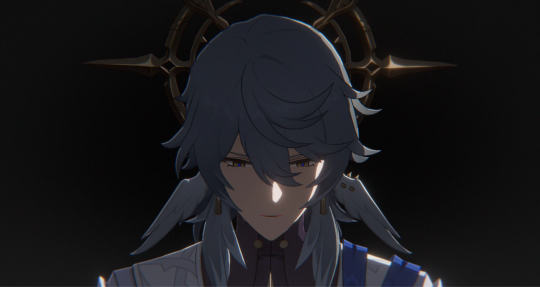
“Sleep sleep happy child. All creation slept and smil’d. Sleep sleep, happy sleep, While o’er thee thy mother weep” -William Blake, “A Cradle Song,” Songs of Innocence and of Experience “So, where is my dream?” “It is a continuation of reality.” “But where is my reality?” “It is at the end of your dream.” -The End of Evangelion (1997)
Considering the majority of his development occurred in Penacony’s third act, Sunday has proven himself as a compelling antagonist who rivals both Takuto Maruki (Persona 5 Royal) and Kevin Kaslana (Honkai Impact 3rd) in grandiosity and pessimism. Although his motivations and methods closely resemble theirs, the tragic path that led Sunday to his rigid belief system began when he was still a child and is intimately related to his experience with family. Having both witnessed the suffering of others and experienced it himself, Sunday’s ideology was born with a single purpose: to shelter humanity from the pain of reality. His answer to life appears rational on its surface and is constructed with kind intentions, but in practice it would have damned the cosmos to a purgatorial world of constancy and doomed its creator to infinite loneliness. It is this tension between Sunday’s intentions and the truth of his actions that fascinates me, because it reveals a deeper conflict within him that is also at the center of Penacony’s story. Here, I’ll use some of Freud’s psychoanalytic theories to illustrate what exactly that conflict is, and why it’s so important for a full understanding of both Penacony's finale and Sunday’s arc thus far.
Cohesion not guaranteed, my brain feels like swiss cheese after 2.2
Spoilers for the entire 2.2 Trailblaze Mission (In Our Time) and a small post-quest with Robin (The Feather He Dropped).
Disclaimer: All content in this post, especially the psychoanalysis, should be taken in the spirit of media analysis and nothing more. Also, corrections and additions are welcome, whether they are about interpreting Freud or HSR. :)
To cut down on post length, external sources (that is, any reading that is not official Star Rail material) are given as numbered in-text citations and gathered in a pastebin document linked at the bottom with the full title and exact page numbers of the source.
And before we begin, a huge thank you to my boyfriend for proofreading this numerous times despite not having played any Hoyoverse games, and for talking out the philosophy with me T_T That’s love right there!
Penacony, Freud, and the Occasion for the Death Drive


“The IPC does not care about its workers! I bet you they would love it if those monsters came and killed me. That way they wouldn’t have to pay for my pension!” “Sounds like somebody could use a Sprinkles cupcake!” -It’s Always Night in Penacony Show
It is impossible to avoid Sigmund Freud when discussing the psychology of dreams, and his psychoanalytic theories are tightly woven into nearly every aspect of Penacony’s environment and story. Our most salient point of entry into his work is The Family’s sweet dream, which embodies the base instinct in human nature towards pleasure-seeking behavior and instant gratification, even at the expense of self-preservation, also known as the pleasure principle.¹ Be it slot machines, luxury cars, decadent food, or endless shopping malls, everything in the sweet dream exists to further each guest’s pursuit of pleasure—such is the purpose of dreams, Freud theorized, as vehicles for wish-fulfillment.² “Death,” let alone pain, is not allowed to exist in the sweet dream in order to preserve that pleasure:
“A further incentive to a disengagement of the ego from the general mass of sensations–that is, to the recognition of an ‘outside’, an external world–is provided by the frequent, manifold and unavoidable sensations of pain and unpleasure the removal of which is enjoined by the pleasure principle, in the exercise of its unrestricted domination. A tendency arises to separate from the ego everything that can become a source of such unpleasure, to throw it outside and to create a pure pleasure-ego which is confronted by a strange and threatening ‘outside’” (Freud, 1930, p. 4).³ “One of the twelve Dreamscapes in Penacony, and its time coincides with midnight. Here, the dream's time is forever stuck at 00:00. Tomorrow will not come, and this night of revelry will never end” (Loading Screen: Golden Hour). Gallagher: …Think about this — what would it cost to create and maintain such a lavish dreamland? Gallagher: It's people's lives. The opulent dream is built upon the decay of spirits, with a toxic elixir called "pleasure" flowing through the Dreamscape. It tempts people to indulge in the Dreamscape, and gradually their minds succumb, becoming nourishment for the sweet dream. (The Public Enemy)
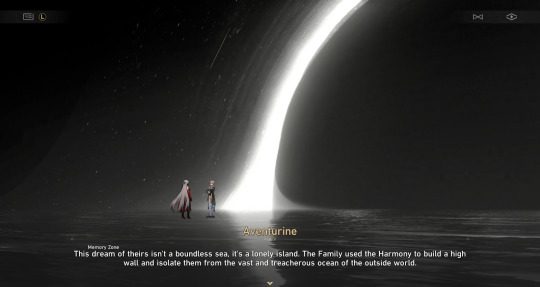
Aventurine: This dream [Memory Zone] of theirs isn’t a boundless sea, it’s a lonely island. The Family used the Harmony to build a high wall and isolate them from the vast and treacherous ocean of the outside world.
But “death” still lurks beneath the juvenile fantasy and its sweet commercial lies, in the yawning chasm proceeding spiritual death. This space, the Primordial Dreamscape, is a chaotic rendering of memories and emotions that goes beyond consumerism as the ultimate form of pleasure, and the high walls of the sweet dream separate each “Moment” from its depths. It is the original form of the sweet dream, its primitive reflection in the Memory Zone’s water, and the crystalline bodies of its memetic entities are like mirrors into the past inviting guests’ introspection.
Introspection is the Achilles’ heel of The Family’s superficial paradise, because curiosity about oneself redirects the ego’s interest from external objects to the inner abyss of thoughts and desires deemed unacceptable in reality, and remembering their existence reveals psychic pain. The Family’s denial of these ‘impure’ thoughts reflects the process by which the ego represses instinctual impulses to avoid that pain:
Robin: While I was away from Penacony, the boundaries of the Twelve Dreamscapes kept expanding outward. But whenever I mentioned the anomalies in my dreams... all The Family heads refused to talk about it. Only my brother was willing to respond... Robin: Later, I discovered the secret letters from the IPC ambassador, which further convinced me that there are hidden secrets beneath the surface of Penacony. So, following the clues in the Oak Family's dossiers, I found my way here... Robin: ...The land of the exiles, concealed by The Family under the guise of "Death", a dream within a dream where Penacony's past is buried. (Small Town Grotesque) “Life is parceled in impenetrable barriers, obstructing the intrusion of the alien. But beneath that ironclad shell, there is a region both nameless and fragile” (Memory Zone Meme “Heartbreaker” Story). “We are very apt to think of the ego as powerless against the id; but when it is opposed to an instinctual process in the id it has only to give a 'signal of unpleasure’ in order to attain its object with the aid of that almost omnipotent institution, the pleasure principle” (Freud, 1926, p. 92).⁴
Freud begins Beyond the Pleasure Principle (1920) by pointing out the foundational assumption of psychoanalysis, namely that all psychic processes serve the pleasure principle in infantile life and the reality principle at a later point of ego development. The reality principle arises from the ego’s instinct for self-preservation, and it redirects pleasure-seeking behavior so that one is willing to wait for its payoff. Rather than relying on dangerous sources of pleasure that provide instant gratification, instead the constraints of reality (or “time”) imposed on the ego and any consequent pain (or “tension”) are endured for the sake of eventual pleasure.⁵ For psychoanalysts, this only further cemented pleasure’s importance in mental life.
However, as World War I came to an end, Freud found these principles alone were insufficient to explain the purpose of trauma dreams in veterans returning from the battle front. Their dreams would faithfully recreate traumatic memories from the war each night, with no pleasurable payoff for the dreamer, and this directly contradicted Freud’s theory of dream interpretation.⁶ If trauma dreams did not fulfill the dreamer’s unconscious wishes, then they did not follow the pleasure principle; they seemed to serve some other purpose.
Though unconsciously repeating pain in waking life was not a new idea in psychoanalysis, trauma dreams highlighted a critical flaw in its understanding of this behavior’s ends. To untangle this complexity, Freud reexamined the aims of the “compulsion to repeat,” and speculated that it is not only an instinctual behavior, but also has an earlier origin than the pleasure principle. He then proposed a dualistic theory of desire that revealed something he believed was common to all organic life—that if there are life instincts, or what he called “Eros,” that are geared towards an organism’s pleasure and self-preservation, then there is also a primary death drive, or death instincts, that aims for its destruction:
Acheron: The Beautiful Dream is crumbling, but not because of a particular Aeon, a particular faction, or a particular visitor. Its collapse stems from a certain inevitability of human nature. The Family refuses to acknowledge this, and it has ultimately backfired and become a catalyst… Acheron: As people immerse themselves in the Dreamscape, where consequences and pain cease to exist, and only ease and pleasure prevail, they draw closer and closer to necrosis. Regardless of the perceived bliss, death looms as the inevitable conclusion. Acheron: Also, this necrosis will diffuse and spread. One piece of the puzzle’s mutation will eventually cause the entire building to shake, break…and crumble. Welt: …In the end, the dreams that people built in the name of freedom became the cage that imprisoned them. (When the Sacred Ginmill Closes)
The “inevitability” Acheron refers to is one and the same with the death instincts as illustrated through the Nirvana principle, originally proposed by psychoanalyst Barbara Low and adopted by Freud in Beyond the Pleasure Principle. Early on in the work, he identifies G. Th. Fechner’s principle towards stability, or the constancy principle, as a greater implication of the pleasure principle’s terms. According to this principle, the psychic apparatus (or ‘psychic processes’) aims not only to relax psychic tension to avoid pain, but also to keep tension low and constant.⁷ But this raises a problem: the pleasure principle’s express purpose is to avoid pain, but pleasure is a finite state that can only be felt as such if there is pain to reduce in the first place. If this balance is interfered with, we do not preserve the initial euphoria of pleasure infinitely, but instead find it dulled with time until it approaches ‘zero’:
“When any situation that is desired by the pleasure principle is prolonged, it only produces a feeling of mild contentment. We are so made that we can derive intense enjoyment only from a contrast and very little from a state of things” (Freud, 1930, p. 16).⁸
This ‘zero’-state is the aim of the Nirvana principle, where it is not just the reduction of excitation but rather its total elimination that is ultimately desired.⁹ In other words, its aim is stillness through the suspension of psychic processes, a state of being that could only find its analogue in dormancy,¹⁰ or something unto death. Acheron’s point is that this necrotic, empty feeling is not an accident, because “death” lays the foundation for something new.
And this, at last, brings us back to Sunday. Incongruence, fantasy, and wishful thinking are just some of what drives Sunday to create his ideal world, a paradise where every day is a day of rest. Though his methods are misguided and extreme, he does this out of compassion for the weak and a sense that he must catch them in his paradise before they crash to their death. In truth, this “paradise” was death in a different form, where reality is inverted with one’s personal fiction and conflict is transcended by removing choice. The conflict between the life instincts and death instincts is key to understanding how Sunday arrived at this answer to life’s pain, but to understand the depth of that conflict we must go beyond his facade and grasp the true meaning of his infantile fantasy. By employing a Freudian psychoanalytic reading of Sunday’s arc, I hope to open new avenues of discussion about both his character and the meaning of Penacony.
The Prison of Fate


“Is darkness equal to daylight? Are sinners equal to the righteous? If you are born weak, which god should you turn to for solace?” -Sunday, Everything that Rises Must Converge “You know, in the thick of things, people are blind to the grit in their eyes...yet they can always feel its scratch. Want the answer? I'll give it to you. The whole thing is just fate playing a cruel joke on us.” -Gallagher, A Walk Among the Tombstones
We’ll begin with Sunday’s warped understanding of society and his ideology, as these represent the first layer of his fantasy. What’s striking about Sunday’s reading of human nature is his pessimistic outlook on human relationships and the potential for individuals to change. Sunday believes that life obeys a natural law called “survival of the fittest,” a perverse interpretation of Darwinian principles of evolution, that categorizes individuals as “strong” or “weak” based on inherent, unchangeable qualities within them. This law is the foundation of a chaotic world where the strong do not defend the weak, but trample them for their own gain:
Sunday: While the Harmony holds noble aspirations, the strong will always be strong, and the weak will always be weak, even in this carefree dream... Human nature contains greatness, but it also harbors inherent weaknesses that can't be eradicated. Sunday: In the end, if people can't even secure their own survival, they won't care about the illusory future of equality. As long as the law of survival of the fittest prevails... there will always be fledglings crashing to their death. (The Only Path to Tomorrow)
Sunday’s ideology takes a page from Arthur Schopenhauer’s The World as Will and Idea, where he argues that the will to life is the reason individuals suffer, because, like the pleasure principle, “the basis of all willing is need, deficiency - in short, pain.”¹¹ Willing is a feature of individuality, which Schopenhauer further identifies as an illusion of nature—that is, individuality obscures how all life is an expression of one underlying Will, the common source of life.¹² In Sunday’s ideology, Schopenhauer’s “individuality” and “willing” are substituted by the term “self-value,” which forms the basis of the illusory prison of human consciousness. Self-value, then, is the root of human suffering, because satisfying the will to life requires taking “value” from others:
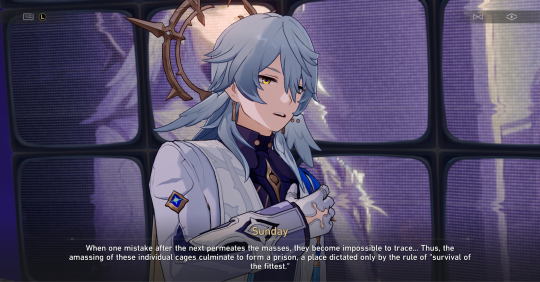
Robin: That's just sophistry. If that were true, then only the powerful would have the right to determine the future. Sunday: Unfortunately, that's exactly what happens. Another name for "the future" is "self-value." [...] Sunday: Some are born weak and vulnerable, some find themselves trapped in unfortunate circumstances, some fall victim to malice and cowardice. When it comes to survival, everyone is equal, and the weak can only watch as their value [future] gets constantly diminished by external forces. (The Only Path to Tomorrow) Firefly: So, what is your definition of living a happy life? Sunday: Good question. Human consciousness is fundamentally an illusion, a cage known as "self-worth". People lured in by this illusion, make mistakes, yet still ask that external influences bear the burden. Sunday: When one mistake after the next permeates the masses, they become impossible to trace... Thus, the amassing of these individual cages culminate to form a prison, a place dictated only by the rule of "survival of the fittest." Sunday: Nature is always accompanied by predation and sacrifice... Its antithesis is known as Order. (Beauty and Destruction)
As long as the will to life must be satisfied, “survival of the fittest” will persist; in other words, the illusion of self-value ensures the law’s survival in the future. While this tells us part of why Sunday equates self-value with the future, his statement can also be interpreted through a psychoanalytic lens, particularly as it relates to transference and the repetition compulsion. Transference is the process by which people unconsciously cast the roles of past figures onto current relationships, repeating past trauma in the present. The individuals filling the roles may change, but the roles themselves remain constant through time. Through transference, a person’s unresolved past and unconscious beliefs adopted from those experiences construct an illusion that passes for objective reality:
"What psycho-analysis reveals in the transference phenomena of neurotics can also be observed in the lives of some normal people. The impression they give is of being pursued by a malignant fate or possessed by some 'daemonic' power; but psycho- analysis has always taken the view that their fate is for the most part arranged by themselves and determined by early infantile influences" (Freud, 1920, p. 15).¹³
Transference is driven by an underlying compulsion to repeat the past known as the repetition compulsion. In Beyond the Pleasure Principle, Freud found that the repetition compulsion does not solely operate in service of the pleasure principle as it was previously understood, but also as an unconscious compulsion to repeat pain. Psychoanalyst and scholar Jonathan Lear provides an example of this in Freud (2015) when he describes the nature of unconscious mental processes:
“Suppose, to take a highly simplified case, a child has an unconscious fantasy, ‘I am the unloved one.’ Precisely because this fantasy is exempt from contradiction and is presented in a timeless mode, the person will tend to interpret life’s passing events through a frame of feeling unloved. The person will focus on real-life slights; but even kind gestures will tend to be treated with suspicion, as though there must be some underlying motive (‘He was nice to me only because he wants something from me’). The world will come to seem an unloving place, thus reinforcing the fantasy. The person can come to feel that she is somehow fated to be unloved.” (Lear, 2015, p. 6).¹⁴
To put Lear’s example in Sunday’s terms, an unconscious fantasy adopted from past experiences is the underlying material that constructs the illusory prison of self-value. The prison shapes our perception of reality, and this perception then reinforces the prison’s ‘form’ by affirming the unconscious fantasy. If one’s perception or the fantasy were to change, the dimensions of the prison would change with them, reshaping ‘reality.’
The prison of self-value therefore ensures the past’s survival in the present by facilitating its repetition; through repetition, the past becomes the prisoner’s future. In other words, by materializing the unconscious fantasy in reality through actions, the prison of self-value becomes one’s fate. We can then apply this framework to Sunday’s ideology: if fantasy and perception co-construct one another to create an individual human consciousness, it follows that Sunday’s ideology, as a reflection of his perception of the world, is rooted in an unconscious fantasy too, a belief that he has about himself.

Sunday: Well, don’t forget this…. not everyone really has a future.
So, just what is that belief? The past holds great significance to Sunday, and he vividly remembers the consequences of each decision he made. While in his inner world, he recounts three decisions that led him to lose faith in the Harmony and choose the Order for salvation. These decisions involved a Charmony Dove he and Robin found as children, a fraudulent stowaway, and Robin’s brush with death while she traveled beyond Penacony. He then asks which choice the Trailblazer would make given each scenario—the same choice as Sunday did, or some other choice? However, the choices are limited to either-or decisions between Sunday’s choice and its extreme opposite: either support Robin’s journey, or prevent her from taking it; either remain silent, or ask the Bloodhounds for mercy; either cage the Charmony Dove, or build a nest for it in a yard of predators, and no matter the choice, it always ends in tragedy.

Sunday: I know the suffering of being tormented, the turmoil of losing your way, how sorrow… and even despair, set in when matters don’t work out. All of this causes me unending pain, because this is not what “happiness” is at all.
This is because Sunday understands the world in terms of dichotomies, where things are either good or bad, righteous or sinful, strong or weak. It’s also why Sunday’s choice in each scenario is cast as the “good” choice, because it was made with kind intentions, while its opposite is the “bad” choice because it lacks compassion for the individual. The unfortunate outcome of either decision, both real and imagined, is therefore meant to persuade the player that Sunday’s perspective is ultimately correct, because “good” choices do not necessarily result in “good” outcomes in a disorderly world. Rather, choice itself is a chaotic variable that introduces uncertainty, splitting life into infinite paths and possibilities, or “untraceable mistakes.” In order to control outcomes, choice must be removed, even if such an outcome can only be achieved through fantasy.
To see the world in this way is to inhabit the monochrome world Acheron first referred to in Act I, a world where it’s all or nothing, and everything appears black or white. This manner of thinking constructs each decision as a false dilemma, which artificially limits the available options or perspectives to two extremes. For our purposes, this is among the most meaningful hints as to what Sunday’s unconscious fantasy is, because it is born out of his intense need for control, which is both a defense against the fantasy and the primary way that he repeats it.
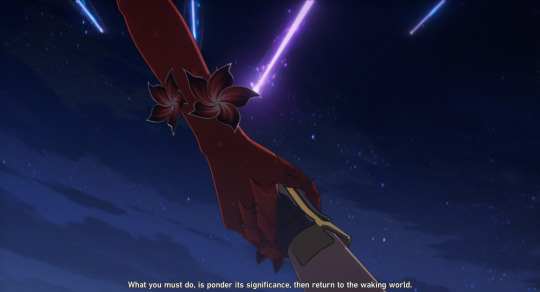
Acheron: The golden dream is getting restless. In the coming long night, I'm afraid you will face many tribulations and witness many tragedies. And finally...your sight will only see black and white. Acheron: But please believe me that in that monochrome world, there will be a glimpse of fleeting red, and when you make a choice, it will reappear before you once more… (The Knocking at Ungodly Hours)
With this in mind, we can use Sunday’s black and white thinking to our advantage. Upon closer observation, a common theme is repeating itself in each decision Sunday did make, with each individual cast in the same role at different points in time. Despite his best intentions, Sunday’s actions alone can’t protect them from tragic outcomes—indeed, he is powerless against their fate. According to his ideology, there are inherently strong individuals and inherently weak individuals, and the strong have the power to defend the weak, but often choose not to; by this same logic, if Sunday can’t defend the weak despite his intentions to do so, then he must not be strong. He must be weak.
This brings us to the Charmony Dove’s fate, which is undoubtedly the most significant to his character out of the three scenarios, and acts as a symbol of the difference between Sunday’s and Robin’s beliefs regarding humanity. The bird is an object that they project these beliefs onto, shaped by their individual “cages,” and its fate reflects those beliefs back at them, reinforcing their diverging fantasies:
Sunday: This place is too dangerous for a fledgling. Let's take it with us — we can put it on the wooden shelf in front of your window. Robin: Okay! A bird like that must have a beautiful singing voice. But where will it live? Sunday: I'll ask the family head to build a cage for it. Robin: A cage... but then it won't have the freedom to fly, right? [...] Robin: Even if it's small and not fully feathered, and can't sing... it didn't come into this world just to be locked up in a cage. Robin: Birds... belong to the sky. (The Only Path to Tomorrow)
To Robin, the Charmony Dove is full of potential, and its fate can’t be determined by a single moment of its life, but Sunday regards it with caution and uncertainty; one wrong move, and the bird will take its last breath. This difference becomes the central disagreement in their debate over the sweet dream’s value, and Sunday reveals the bird’s tragic fate to Robin in order to drive home his point:
Sunday: Shortly after you left, it crashed to its death right in front of your window. Robin: ...I had surmised as much. I knew you wouldn't have avoided mentioning the bird for no reason. Robin: Despite that unfortunate outcome, I still believe it was the right decision. Birds aren't meant to spend their lives in cages... They belong in the sky, even if they can't fly. Sunday: But here's the thing. If there are birds in this world that can never fly, can we really assert that they belong in the sky?
Sunday’s meaning is clear: flightless birds are no different from those individuals who are born weak, and their fate is to watch their future disappear under the pressure of external influences. While Robin came to embody her beliefs by leaving Penacony behind, Sunday stayed and rose through the Oak Family’s ranks, never leaving the sweet dream’s cage. He embodies his beliefs by denying himself a future, because to choose otherwise would contradict his fantasy—that he is a flightless bird too, and therefore has no “value”:

[Sunday]: The victor bears the responsibility of victory. Finish me... and fly into the sky. [Robin]: We were supposed... to fly into the sky together. [Sunday]: ... [Sunday]: If only... I could… (The Feather He Dropped)
Sunday's unconscious fantasy—that he is an inherently weak person, a bird that will never fly—is a reflection of his self-value. By unconsciously repeating the pain of his past, his fantasy becomes the illusory prison known as one’s future, a self-fulfilling fate.
But all of this is only a small piece of the puzzle. It tells us what the unconscious fantasy is and how it affects him, but it doesn’t really tell us why he has it in the first place. Just as the belief was hidden in the shadows of Sunday’s ideology, its origin is hiding behind something even more conspicuous—a grand performance on the dreamscape’s finest stage.
An Infantile Drama
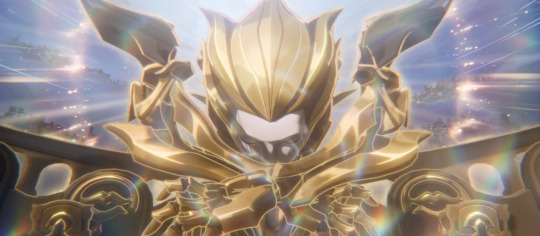
Trailblazer: Where is the Stellaron? Why am I not seeing it? Sunday: It hides behind the curtain. Or rather, it is the theater itself. (Everything that Rises Must Converge)
Naturally, this leads us to the Embryo of Philosophy.
There is so much to talk about between the three phases of this entire fight, not to mention the mountains of references it makes to other media. However, I want to train our attention on the Embryo’s tears. Why is it crying, and why at this particular moment? The religious meaning of its tears is clear, but what is their psychoanalytic significance?
First, let’s consider their context. The Embryo’s golden tears stream down its face with each turn of “Im Anfang war das Wort” (“in the beginning was the word”), stretching its arms towards the sky with palms open in worship of Order. On the 8th turn, it reaches toward the sky to ask for Ena's blessing; Ena answers its call, reaching down to grant it power, nearly touching the Embryo’s outstretched pointer finger with THEIR own. In doing so, they create a mirror image of Michelangelo's The Creation of Adam, a depiction of God giving Adam the spark of life.
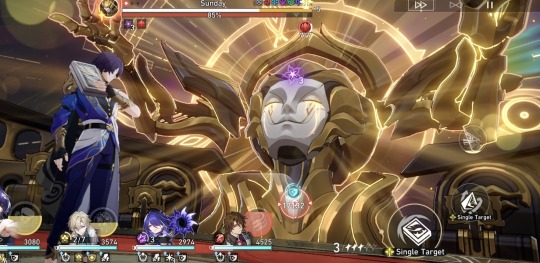

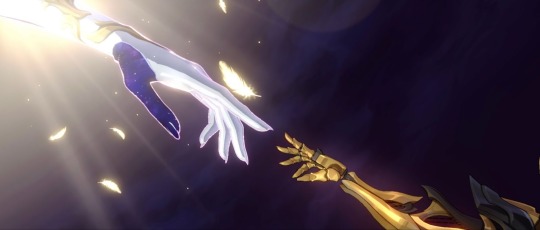
This artistic and religious reference, alongside the Embryo’s fetal imagery and tears, leaves no doubt that the third phase in the fight is Sunday’s “moment of birth” as an Aeon, and this suggests that birth must inform the answer to our original question. So then, why does the Embryo’s “birth” bring it to tears? The answer lies in the meaning of Sunday’s performance in Penacony Grand Theater, of which the Embryo is just one part, and how it relates to his unconscious fantasy.
In a final effort to dissuade the Astral Express from resisting his plan, Sunday stages a dramatic retelling of the Order’s Genesis story and Penacony’s history that chronicles its changing masters through the eras. As an immersive stage play, its completion hinges on the crew’s participation, which involves slaying the master at each act’s conclusion in order to usher in the next one. Through his play, Sunday argues that humans crave a master who can provide them with meaning in the face of chaos, and because of this inherent weakness, progress is an illusion. The past, present, and eternal show of human history is one of endless repetition and self-delusion – though the individual master may change, humans remain puppets by their own design.

The Past, Present, and Eternal Show
This fraught relationship between humanity and its masters was a foundational point of Freud’s theory of the death instincts, which he grounded in his observations of infantile play. While he was staying with his daughter’s family, Freud noticed a peculiar game his grandson played with his toys that further called the pleasure principle’s dominance into question. The game began when his grandson threw the toys out of sight to make them “disappear,” after which he would retrieve them with his mother’s help to make them “return.” Freud deduced that this game (Fort/Da) was a reenactment of his mother “disappearing” when she left him at home, and speculated that it played a crucial role in his grandson’s good behavior during her absences.¹⁵ If the game was in service of the pleasure principle, Freud expected that the entire game would be played to completion, where the pain of the toys’ disappearance is endured for the eventual pleasure of their return. Instead, his grandson often only repeated the disappearance – the “drama’s” most painful part.¹⁶
In infantile play, several instincts intersect with a child’s memory in order to process psychological stimuli.¹⁷ Repetition facilitates their sense of mastery over unfamiliar stimuli, whether pleasurable or painful,¹⁸ and play offers a safe, fictional space for children to make sense of reality, where they can leave behind their role as spectators of life’s phenomena and become actors on its stage.¹⁹ By playing an active part in a memory’s repetition through play, indeed by controlling it, children move toward an even grander wish in their hearts: “the wish to be grown-up and to be able to do what grown-up people do.”²⁰ Freud suspected this was why his grandson played the game, because it offered him a sense of agency over his mother’s absences that reality could not.
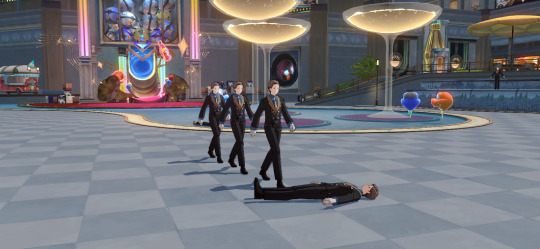
The Golden Hour base model and its uncanny inhabitants, found in Dewlight Pavillion. One of the Oak Family Head’s toys.
However, Freud’s point was not that repetition in infantile play is pathological, but rather that when trauma is repeated in adult life—a time when experiences do not feel so new, and therefore do not bring as much pleasure or sense of mastery per repetition²¹—the mind is reverting to a previous state,²² namely to the way it functioned in childhood. In other words, the repetition compulsion is related to the instinct for mastery, and trauma repetition is the mind’s attempt to master a painful experience by replaying the past in the present, as it did through infantile play. In this way, life itself becomes the game, or a “play,” and fantasy merges with reality.
Now, let’s examine the conclusion of Sunday’s stage play, as humans take fate into their own hands on the Genesis story’s seventh day:
2:1 THEY bestowed upon all beings the gift of ‘meaning.’ All had been brought into existence. And then, THEY rested from all THEIR creative work. 2:2 However, once again, all the beings beseeched Ena, praising THEM, the magnificent Aeon with divine power, but with a tone of curse. 2:3 ‘With Order, you have defined all things in the Cosmos, yet this only made us realize that we are mere puppets within your grasp.’ 2:4 Thus, on that day, all beings united and cast the Aeon into the pit of destruction. 2:5 And so it was done. That marked the seventh day. (Lost Property readable)
Like a parent guiding their child, Ena imbued the universe with meaning through Order, weaving the answer to each of humanity’s questions into THEIR grand symphony. Humanity then recognized its passive role in relation to Ena, a higher being who is able to act on the universe’s grand stage, while mortals merely watch THEM. And just as Freud’s grandson casts away his toys in the first part of the drama, humanity then casts Ena into the abyss to make THEM “disappear,” rejecting their old master in a bid for control only to seek THEM out again in the eternal show. In their effort to become masters, humans seal their fate as puppets; or by another interpretation, this is the intended outcome all along, because out of the two desires at play here—the desire to replace the master themselves and the desire to submit to another—answering to a new master is far easier than becoming one:
[Tiernan]: Sin Thirsters... the obsessions of the Pathstriders. They emerge from the depths of IX, seeing themselves as masters of their own destiny, unknowingly repeating the actions of their past lives. [Tiernan]: They emerge from the Nihility and head toward it, leading purposeless lives… (And on the Eighth Day) Butler: "Either I shall be my own master, or I shall return to my former master! I shall not submit to a new master under any circumstances!" "I wish they could regain their reason [calm down] and cast away the shackles of hypocrisy," proclaimed the new master. (Tune Butler's emotion to Calm) Butler: "Without a master, who can grant me true freedom?" (Everything that Rises Must Converge)
By returning the planet to Order, its Pathstriders hope to reinstate the earlier phase of galactic history before Ena was absorbed by Xipe the Harmony. Understood through Freud’s observations of infantile play, this can be seen as a struggle between retaining the innocence of childhood, the previous state, and the “grand wish” to become an adult with agency; desires that are at once contradictory, and yet work in tandem with one another. But is this really all that Sunday’s performance is about?
For the moment, let’s return to trauma repetition and its conflict with the pleasure principle. To Freud, trauma is like a bodily wound, where unfamiliar stimuli “breach” the mind’s protective layer and overwhelm it; the repetition compulsion is a response to this breach, replaying past trauma in the present so that the mind learns to anticipate the disturbance in the future:
“The fulfilment of wishes is [...] brought about in a hallucinatory manner by dreams, and under the dominance of the pleasure principle this has become their function. But it is not in the service of that principle that the dreams of patients suffering from traumatic neuroses lead them back [...] to the situation in which the trauma occurred. [...] These dreams are endeavouring to master the stimulus retrospectively, by developing the anxiety whose omission was the cause of the traumatic neurosis” (Freud, 1920, p. 26).²³
This brings us to the final pillar of Freud’s death drive. If the repetition compulsion is an instinct, then it must not only be common to all organic life, but also must originate from a shared disturbance in evolutionary history. But a disturbance of this scale, he realized, could only be found in what shaped life’s beginning—the physical and chemical processes that cultivated life on Earth, rousing the first unicellular organism from its slumber in the primordial soup, and animating what was once dead. The repetition compulsion, then, was born from this original trauma of organic life, unanticipated by that ancient sea. And if that is the case, then the repetition compulsion’s true purpose is clear: it aims to return the living to its slumber, to the death state, and it dutifully follows life’s “circuitous paths” to bring about that end:
“It would be in contradiction to the conservative nature of the instincts if the goal of life were a state of things which had never yet been attained. On the contrary, it must be an old state of things, an initial state from which the living entity has [...] departed and to which it is striving to return by the circuitous paths along which its development leads. If we are to take it as a truth [...] that everything living dies for internal reasons—becomes inorganic once again—then we shall be compelled to say that 'the aim of all life is death’ and, looking backwards, that 'inanimate things existed before living ones’” (Freud, 1920, p. 32).²⁴
The implications of this theory can be seen in Penacony’s oceanic imagery, which signifies both the unconscious memory of that primordial state and the salvation the sweet dream offers from reality. To enter the dream, The Reverie’s guests submerge themselves in a shallow pool and emerge on the “other side” reborn, baptized into the religion of pleasure and cleansed with the dream’s fiction. The primordial memory, then, is the lost childhood of organic life, a previous state it wants to return to — the unity before the violence of individuality.

Sunday: Some are born weak and vulnerable, some find themselves trapped in unfortunate circumstances, some fall victim to malice and cowardice. When it comes to survival, everyone is equal, and the weak can only watch as their value [future] gets constantly diminished by external forces. [emphasis added].
We also don’t need to stretch our imagination to connect all of this back to Sunday, who compares the weak to spectators of their own demise, just as Freud likens children to spectators of life’s phenomena, and perceives “external forces” as catalysts for change—for Sunday, they whittle away at one’s future, while for Freud they disturb a peaceful slumber.
How is all of this related to the Embryo’s tearful birth? The primordial soup was a cradle for organic life in its infancy, but it was also the “mother” that birthed it, and the death instincts compel life to return to its embrace. In Inhibitions, Symptoms, and Anxiety (1926), Freud identifies birth as the first “danger-situation” an individual experiences, because birth requires separation from their mother.²⁵ By coming into the world, newborns are inundated with unfamiliar stimuli, like the unexpected “breach” that characterizes trauma, and these sensations in turn produce the first instance of anxiety.²⁶ Though they can’t yet conceptualize this danger as the loss of their mother, for mental life at this stage doesn’t distinguish between the self and other objects, infants soon learn the uncertainty that accompanies danger can be relieved through their mother, who “satisfies all [their] needs without delay”; anxiety, then, is a response to situations where these needs go unsatisfied, and over which they alone have no control.²⁷
But birth is only the first separation between mother and child; the final separation, of course, is death. If the former’s danger is characterized by the mother’s absence (“object-loss”), then in death this danger becomes permanent. In Mourning and Melancholia (1917), Freud writes that mourning is a process of “[accepting that] the loved object no longer exists” and of withdrawing one’s interest (“libido”) from them.²⁸ Melancholia, its fraternal twin, shares several affective traits with this process, namely “a turning away from reality […] and a clinging to the object through the medium of a hallucinatory wishful psychosis”—that is, by living through fantasy.²⁹ Where melancholia distinguishes itself from mourning, however, is in one’s sense of responsibility for the object’s loss. In other words, the melancholic is tormented by a pervasive sense of guilt:
“In mourning it is the world which has become poor and empty; in melancholia it is the ego itself. The patient represents his ego to us as worthless, incapable of any achievement and morally despicable; he reproaches himself, vilifies himself and expects to be cast out and punished […] He is not of the opinion that a change has taken place in him, but extends his self-criticism back over the past; he declares that he was never any better” (Freud, 1917, p. 246).³⁰
Sounds a little familiar, doesn’t it? Transference is another way of living life through fantasy, where each new actor plays the same role in its infinite drama, in this case the “lost object.” The Charmony Dove, the fraudulent stowaway, and Robin all unknowingly take on this role in Sunday’s unconscious, as objects he is trying to protect. However, this performance is always fated to end the same way: his actions fail to save them, and he blames himself and his weakness for their loss.

If performance is the throughline between reality and fiction, then Sunday’s “play” in Penacony Grand Theater—the birth of his paradise and near-ascension as an Aeon—is yet another continuation of this eternal show. Sunday’s greatest wish, his infantile wish, is to protect everyone, and Ena’s dream facilitates its fulfillment through fantasy. To realize the dream, Sunday must usurp the power of a master (an Aeon) for himself, and he does so by fusing the Harmony and Order together to create the Embryo of Philosophy, making Xipe and Ena its 'mothers.' But the Embryo’s birth also requires the “death” of its creators, precisely because their power had to be stolen to create the eternal dream’s foundation. In other words, the Embryo must replace its parents so that it may truly become a master like them. Sunday's full performance encompasses both separations between “mother” and child at once: the separation through birth, and the separation through death.
In their Christian interpretation, the Embryo’s tears signify Christ’s empathy for human suffering, but in the psychoanalytic interpretation they suggest the Embryo’s anxiety about its performance. And this anxiety is well-founded, for all of the reasons we’ve discussed: the primordial danger of being born into the world, of emerging from “death” and becoming separate from it, and the threat of permanent object-loss if the Embryo completes the performance as planned. But we should also remember that this anxiety is in reality nothing new for Sunday, because he has already experienced all of these losses first-hand in the past. In other words, the Embryo cries because its performance reminds Sunday of something he’s experienced before, the very memory that he is trying to control—indeed master—through repetition. This memory, and the anxiety, concerns his wish’s original failure to materialize, the trauma of which laid the foundation for each subsequent “performance.” Plainly, it’s about the death of his mother, and his failure to protect her from the Stellaron disaster.
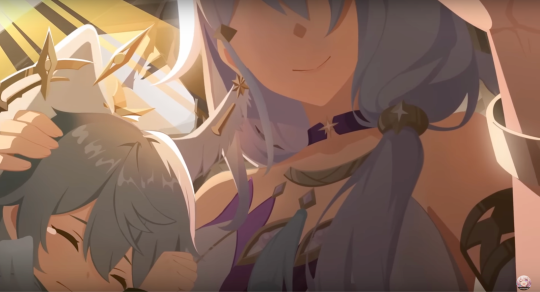
Given how he belabored the importance of his three decisions in his inner world, this may seem like a bit of a stretch. In fact, he doesn’t directly say a word about his mother at all — but that is exactly why I am so suspicious. Instead of acknowledging her with words, her death lingers in his desperate need to control outcomes, his preoccupation with weakness, and his yearning for guidance from a master, something he lost as a child when he needed it most. Perhaps this is part of what motivates him to become that master for everyone else, to replace the parent he lost by “becoming” them.
It’s also not lost on me that Sunday cries during the Stellaron disaster, further suggesting a narrative parallel between the Embryo crying and his past. In that moment, his tears highlight the incongruence between the image Sunday puts forth of himself as Robin’s protector, and the reality that he alone was never able to protect anyone. His mother died, Robin got shot, and suffering followed his decisions despite his kind intentions. From an early age, he had already given up on the possibility of sharing a stage with his sister, and eventually resigned himself to a grim fate as the universe’s lone star. While Gopher Wood’s role in reinforcing his unconscious belief should not be understated, I hesitate to say his poison is truly the belief’s origin.

“The echoes of the memories someone once held of their beloved family. Across the long night, they will accompany him in the past, present, and future.” (Echoes of Faded Dreams story)
What’s more, Sunday tells us that his end goal is not to resurrect Ena, but rather to construct his paradise on Ena’s remains, creating a world without Aeons at all. This infantile fantasy, a world without the “adult” influence of these higher beings, is a metaphor for his search for happiness after the meaningless Stellaron disaster that took his mother away from him, and to recover the innocence he lost with her passing. He seeks to create paradise from destruction, to build a new world on her remains, and become a master of it himself. Both his stage play and his role as the conductor of the paradise’s symphony only further cement this: through his performance, he asserts that he is no longer a passive observer of the disaster, no longer a spectator of his own demise or merely Gopher Wood’s puppet, but an actor and an artist in his own right. By utilizing the Stellaron to create paradise, he hopes to master his weakness.
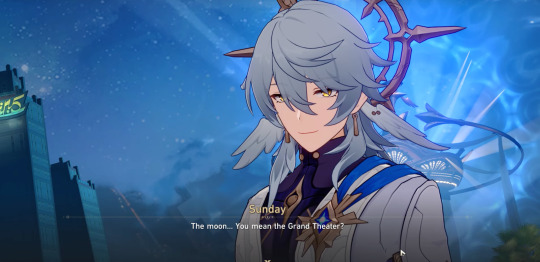
This symbolism goes crazy. What do you mean the Stellaron is a theater, it shines like the moon, it’s the reason Sunday’s mother died*, and it’s the site where he initiates Third Impact?
And I know, I know all of the Evangelion fans are saying “we fucking knew this already,” and you’re right! Hideaki Anno was also inspired by Freud, among many other psychoanalysts and philosophy giants, and Hoyoverse has never been shy about how much Anno’s work influences their own. It is undeniable that Shinji and Sunday share a character arc as it relates to the loss of their mother, and Sunday is far from the first and certainly not the last Hoyoverse character who will either, but where they differ is in the details of their death wish. In The End of Evangelion (1997), Shinji wishes for a world where he can’t be rejected by others, because there would be no meaningful difference between him and another person if they’re all just LCL soup, while Sunday wishes for a world where the weak never have to face their weakness, and weakness is no longer a “sin”; the outcome of both of these wishes, then, is a world where sin can never be repeated. But this tragedy’s ending was told from the beginning — trying to sever the cycle is the same as repeating it, and shedding one master means gaining another. Rather than preserving life and protecting it from pain and disappointment as he intended, Sunday’s dream world only guarantees its own end.
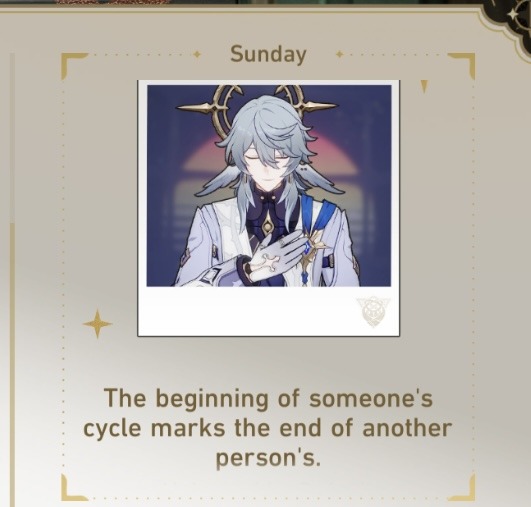
This is why the Embryo cries. Sunday’s performance is a reenactment of both the first and last severance between his mother and himself—his birth and her death—and the origin of the pain that would eventually justify the eternal dream’s creation.
*I say this with the huge caveat that Penacony lore, Halovian lore, and Sunday + Robin lore, are a bit (okay, very) confusing. It is possible their homeland was destroyed by a different Stellaron. Also, who am I to assume Halovian birth even remotely resembles human birth? I don’t know. Talk about how vague Halovian lore is right now in the version satisfaction survey and maybe we’ll get real answers.
Infinite Sin and the Will to Punishment
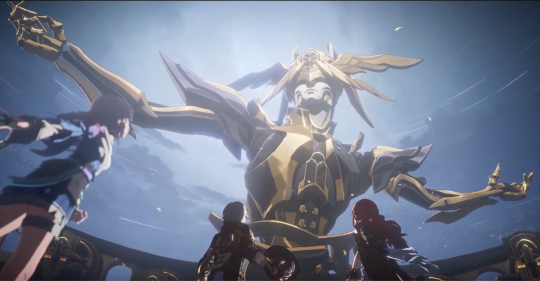
Unfortunately, it isn’t quite that simple. Freud did not believe that this pessimistic interpretation of the death instincts was the full story of the death drive, and this analysis, though fruitful, is full of apparent contradictions as a result of treating it that way. Though it’s not incorrect to assess Sunday’s actions from a self-destructive angle, this alone is an inadequate framework for illuminating the full extent of his hypocrisy. We see glimmers of it in Sunday’s inner world, when he admits the price of attaining his dream—“merely a personal and eternal sacrifice”—and in Penacony Grand Theater, when Himeko points out the fallacy that this could ever truly be a dignified existence for the many living under Sunday’s will. The tension between his willingness for self-sacrifice and desire for total domination is a core conflict of Sunday’s character arc in Penacony. These two aims constantly struggle to overcome one another, and within that struggle lies a truth about the nature of life and the meaning of Penacony’s story.
The seductive promise of Sunday’s paradise belies its reality, which requires the paradise’s conductor to remain awake until the end of time. Sunday minimizes the personal cost of Ena’s dream by portraying himself as a martyr for a noble cause, because to him this solitude truly is a meager price to pay for everyone’s eternal “happiness.” However, Robin is the first to point out that his role in sustaining the dream looks less like a heroic sacrifice than it does eternal punishment:
Robin: It's true that some people are born strong, and others are born weak. If the Trailblaze is the target of heroes, then the Harmony will guarantee that the strong help the weak. Only the people of Penacony themselves can be the saviors of their homeland. Robin: Their path of happiness should be forged by themselves. While I may not be a Nameless, I'm willing to instill courage in all those who need it. Robin: This includes my brother as well. Ena's Dream... is too cruel for him, and everyone else. […] Robin: Brother, you have heard their cries... This is not the paradise they hoped for. "Harmonious Choir" The Great Septimus: Even so, they don't know where they should be heading. That's why... I had to become the lone star in the sky to guide them. Robin: Even if that star... must hang in a perpetual night of solitude? (And On the Eighth Day)
And one does have to wonder: why would Sunday, who has clearly demonstrated his own desire to turn away from the pain of reality, deliver a fantasy world that promises just that to everyone but himself? To begin to unpack this, let’s return to the idea of guilt, which we briefly touched on in the discussion of melancholia.
Before developing his death drive theory, Freud attributed a wish for punishment to dreams and behaviors which, on their surface, contradicted the pleasure principle’s tendency to avoid pain.³¹ These dreams, he argued, represented a masochistic tendency in human nature, where “[pain] for one system [is pleasure] for the other.”³² But Freud’s understanding of masochism changed with Beyond the Pleasure Principle, which raised the possibility that masochism was originally a death instinct that was altered by the life instincts to serve the pleasure principle.³³ He was then able to take up masochism with a newly instructive angle in The Ego and the Id (1923), where he formally introduced not only the term “id” for the realm of the instincts, but also the “super-ego,” an omnipresent and judgmental conscience that defines the ego ideal.³⁴
The super-ego is a representation of the ego’s parents and their teachings, reborn from the ruins of the Oedipus complex and its unfulfilled wishes. The Oedipus complex is named for the ill-fated protagonist of Sophocles’ Oedipus Rex, who unknowingly murders his father and marries his mother, thereby fulfilling a prophecy he sought to avoid. After he is made aware of his moral failings, he blinds himself in shame and goes into exile from his former kingdom. In The Interpretation of Dreams (1899), Freud describes the Oedipus complex as an early stage of child psychosexual development where the child’s parent of the opposite sex is cast as their first sexual object.³⁵ But this nascent sexual attachment creates a dilemma for the child, because in order to fulfill the Oedipal wish (attaining a “union” with the loved-object), they have to triumph over their rival, the parent of the same-sex. The child then develops an “ambivalent” attachment to their same-sex parent, where the familial love they have for them is complicated by their desire for the other parent.³⁶ However, the child soon realizes that its options to fulfill the Oedipal wish are untenable with reality, and the price of achieving it is severe punishment at the "rival's" hands.³⁷ It then abandons the Oedipal wish by repressing it, instead developing a strong “identification” with the same-sex parent—that is, instead of trying to kill the father to be with the mother, it tries to become like him.³⁸ This identification establishes the ego’s moral framework.

On the left, Sunday crying in his ultimate animation. On the right, a photograph by Albert Greiner of actor Louis Bouwmeester as Oedipus after blinding himself in Oedipus Rex. This shit, as they say, writes itself.
Penacony’s environmental design references the super-ego through its persistent eye motif, which represents surveillance in the sweet dream and introspection in the primal dreamscape. In addition to its psychoanalytic roots, the eye motif in Sunday’s character design both furthers his angelic iconography and visually connects him to Ena, whose eye represents THEIR sovereignty over mortals through the law.
Surveillance is central to any system of government that prioritizes control like the Order does, and the resulting paranoia of such a system encourages rigid adherence to its rules. Likewise, the super-ego watches the ego’s thoughts and actions for signs of transgression and punishes it for every immoral impulse, whether acted on or merely imagined. The threat of punishment is what motivates the ego to enforce the super-ego’s imperatives, repressing impulses that fall outside the sphere of moral acceptability and casting all that is not orderly outside of what comprises it. In Penacony, the analog for the super-ego is most closely found in Gopher Wood, the Dreammaster, who oversaw the sweet dream’s descent into hedonism in order to strengthen his influence and nurture the Stellaron. This is also why he is often embodied as a raven who spies on Penacony’s scenes, acting as Sunday’s “eyes” to maintain control of all the actors.

“Something Unto Death”
It should come as no surprise, then, that the super-ego also plays a crucial role in the eternal show. The super-ego is built on the teachings and morals of the past as embodied by the individual’s parents, and these values guide the ego in the present so that the ideal may be attained in the future; in other words, the super-ego ensures the past’s survival through its repetition in the present so that it becomes one’s future.³⁹ Of course, the super-ego is not literally the ego’s father, but rather a representation of him recreated within the mind.⁴⁰ Perhaps this is why Gopher Wood is able to “speak” through each Oak Family member in the present, despite his body’s immolation in the past — his rules survive in their minds as the supreme source of moral guidance. That, and dream logic.
As both a political and religious fundamentalist leader in the dreamscape, Gopher Wood radiates the “Father” archetype, marking him as an authority not only of Penacony’s civic prosperity, but of righteousness itself. Because of this, he is a surrogate for divinity—for Xipe the Harmony in public, and for Ena the Order in private—capable of judging the ego in "God’s" place. While this relationship to some extent applies to all Oak Family members, it is especially true for Sunday and Robin, for whom Gopher Wood literally plays the role of their adoptive father. For Sunday, as Gopher Wood’s successor in the Oak Family and tool of the Order, this takes on an even greater significance. Their relationship constitutes a faithful representation of the ego and the super-ego, where Sunday is taught by Gopher Wood to uphold the Order’s ideals to be a morally righteous person, and to repress all of his ‘imperfection’:
“As a substitute for a longing for the father, [the super-ego] contains the germ from which all religions have evolved. The self-judgment which declares that the ego falls short of its ideal produces the religious sense of humility to which the believer appeals in his longing” (Freud, 1923, p. 33).⁴¹ “It's said that the master of this pavilion suffers from severe compulsions, but this table clearly shows that he has been cured.” “Unlike a long table, round tables have no sense of priority or opposition, it is very likely that they are an Aeonic candidate for the Path of Harmony” (Conference Round Table investigations in Dewlight Pavillion) [emphasis added].

Killing the “Father”....to be with the “Mother”?
But the super-ego’s standards aren’t truly meant to be achievable for the ego, because the ego’s identification with the parents is defined by its difference from them; to disrupt that identification would be to confuse the ego’s sense of self.⁴² This is yet another manifestation of the ego’s conflict between remaining subservient to its “master,” the super-ego, or overthrowing it to become the new master:
“[The super-ego’s] relation to the ego is not exhausted by the precept: ‘You ought to be like this (like your father).’ It also comprises the prohibition: ‘You may not be like this (like your father)–that is, you may not do all that he does; some things are his prerogative’” (Freud, 1923, p. 30).⁴³
Thus, the ego creates an impossible task for itself. It wants to be seen as a morally righteous subject, and it tries to achieve this by modeling its every thought and action after the “Father.” However, the ego can never truly censor all 'impure' impulses, and for this reason it will always be deserving of punishment; this is the source of the ego’s persistent sense of guilt.⁴⁴ The tension between the super-ego and the ego is what Freud referred to as “moral masochism,”⁴⁵ wherein the ego not only fears the super-ego’s punishment, but also unconsciously desires it. Moral masochists do not care who punishes them and do not limit their suffering to sexual fantasies—instead, “the suffering itself is what matters.”⁴⁶
This desire is the result of several transformations that occur in the death instincts. Earlier, I mentioned that we were working with an incomplete understanding of the death drive—that the purpose of life is to return to death. But life is almost never this frictionless, and neither is instinctual life. In reality, the death instincts all trend toward self-annihilation and restoring the state before life, but the life instincts persist alongside them to preserve life. Taken alone, they are only capable of stagnation; together, as each struggles against the aims of the other, life can evolve and progress into new territory, ‘blazing a trail’ towards new beginnings — “life itself [is] a conflict and compromise between these two trends.”⁴⁷ To make "life" possible, the death instincts are fused with the life instincts, making it difficult if not impossible to observe any one behavior that purely exhibits the death instincts.⁴⁸
One product of these fusions is the sadistic instinct. In The Economic Problem of Masochism (1924), Freud affirms what he had only surmised in Beyond the Pleasure Principle—that sadism is an inversion of a primary masochism, where what was once a death instinct bent on self-annihilation is now a “destructive instinct” fused with Eros that seeks to 'master' others:
“The libido has the task of making the destroying instinct innocuous, and it fulfills the task by diverting that instinct to a great extent outwards [...] towards other objects in the external world. The instinct is then called the destructive instinct, the instinct for mastery, or the will to power” (Freud, 1924a, p. 163).⁴⁹
But a portion of that aggression is retained in the ego, attached to the super-ego (the 'master'), and redirected towards the ego; hence, moral masochism.���⁰ In other words, the desire to punish others is reconfigured through the super-ego as a desire to punish oneself.
So what does “punishment” mean here? Freud concludes The Ego and the Id by arguing the fear of punishment is really a fear of losing love and protection from the parents, “Destiny,” or the super-ego. If their love is only garnered through moral behavior, then immorality risks its withdrawal. Without love, the ego is vulnerable to the world and its dangers, and to the possibility of its death—thus, the fear of punishment is really the ego’s fear of death, and consequently, its desire for death:
“The fear of death in melancholia only admits of one explanation: that the ego gives itself up because it feels itself hated and persecuted by the super-ego, instead of loved. To the ego, therefore, living means the same as being loved [...] But when the ego finds itself in an excessive real danger which it believes itself unable to overcome by its own strength [...] it sees itself deserted by all protecting forces and lets itself die” (Freud, 1923, p. 61).⁵¹
Now, let’s consider the origin of Sunday’s melancholy, his failure to protect his mother. This ‘sin’ is at the center of his performance, and it is the pain he keeps repeating over and over again. He repeats this pain because he feels guilty for being too weak to protect his loved ones, and that guilt finds its source in his severe and unforgiving super-ego. Sunday suffers immensely from the responsibility he feels for everyone’s happiness, let alone his loved ones’ safety; it is strongly implied that he has obsessive-compulsive disorder, a condition that likely wasn’t helped by the Order’s strict rules. But Sunday fundamentally suffers for the same reason that everyone else suffers — because ‘sin’ is infinite for imperfect beings, and no amount of repression can change that. The guilt he feels for this is also infinite. One of the reasons that Sunday volunteers himself as the Order’s sacrificial lamb is because he believes the suffering of others to be of higher importance than his own, certainly, but it is also because of the self-punishment he is promised through the plan’s outcome. In other words, his infinite solitude is a form of justice for his original sin and is, by design, a death sentence.
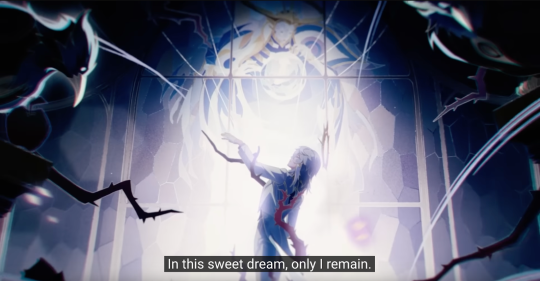
This leaves us with our final contradiction to untangle. The deceit of Sunday’s dream world is its benevolent veneer, which obscures the violence of its compulsive unity at the expense of individuality. Before his performance in Penacony Grand Theater, Himeko acknowledges Sunday has “a strong conviction and a desire for dominance” that cannot be satisfied through debate alone; he derives far more pleasure from demonstrating his superiority through example. We witnessed that aspect of his personality firsthand when Sunday subjected Aventurine to a trial from the Harmony and branded him with its death sentence, an outcome he took utmost care beforehand to ensure was predetermined. However, when Himeko calls Sunday on the hypocrisy of his martyrdom, he dismisses it and shuts down any further debate:
Sunday: True goodness can only be achieved through faith. Himeko: Allow me to point out that falling into a permanent slumber is not happiness, especially when those people are driven by someone else's will in their sleep. […] Sunday: My sole objective is to create a paradise free from Aeons, where the Order ensures the dignity and happiness of all humanity. A paradise exclusive to us human beings. Himeko: That's not the case. If people are to live with dignity, there must be nothing and no one above them. Himeko: In your so-called paradise, you would be the one reigning supreme. Sunday: Looks like we won't be able to convince each other. Now that our conflict has been destined, let's unveil our Paths and reveal to the universe the true path. (Everything that Rises Must Converge)
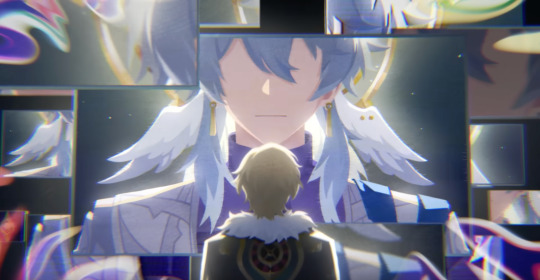
You know he enjoyed every second of this. (From Aventurine’s “A Moment Among the Stars - Inherently Unjust Destiny” trailer).
Circumstances aside, good intentions or not, Sunday is not without his own stubborn will that he imposes on others. Acknowledging this neither throws everything we’ve discussed beforehand out the window, nor does it suggest that Sunday’s martyrdom isn’t genuine. It does ask whether emphasizing Sunday’s martyrdom at the expense of his capacity for sadism is possible without disregarding his agency. In other words, Sunday did not create a dream world that excludes himself by design solely to punish himself and move closer to death; the control it offers him over others, though illusory, is just as appealing. Playing “God” in this way is an extreme and, in a sense, ‘aggressive’ expression of his own will to life, an equally fervent wish to surpass his “master,” protect the weak, and forge a new beginning.
In Sunday’s manifestation of Dominicus, we see both the sadistic instinct and the masochistic instinct represented as two sides of the same being. On one side is the confident and domineering Septimus, who, as the maestro of the eternal dream, embodies the sadistic instinct for mastery over others; on the other side is the Embryo of Philosophy, representing the masochistic instinct to return to the mother.
We’ve already discussed the Embryo of Philosophy at length, but Septimus also merits closer attention. In contrast to the Embryo’s fragile, withdrawn posture and emotional vulnerability, Septimus is towering, ostentatious, and grandiose; it makes wide, sweeping gestures that cover the entire stage, carrying itself with an authority that commands the audience’s attention. Indeed, Sunday puts on a voice as Septimus**, lowering his pitch and raising its volume so that it booms with the power he so desperately craves. Even its title, “The Great Septimus,” reads more like a character in a child’s fantasy than a threatening embodiment of Order with the means to suppress autonomy. In other words, Sunday treats Septimus as a persona, an image he wants to project into the world, or a “fictional” version of himself; plainly, it is a manifestation of his ego ideal.

The destruction of this nascent Aeon’s body therefore holds great significance as we move into the conclusion of Sunday’s character arc, at least for his role in Penacony. Dreams exist in the liminal space between reality and imagination, much like the “self” straddles the ideal and the real. Destruction and creation are rules of the universe that can’t be transcended, and the “self” is always in flux; but because of this chaos, there is always a chance to change one’s fate. Septimus represented Sunday’s infantile wish to protect everyone, no matter the cost, and the Embryo of Philosophy signified his desire to remain the same forever, as he was in childhood. Without their armor to protect him from reality, he once again faces the primal fear of life and the inevitability of one’s death. But rather than letting himself die in an ocean of guilt, there’s a chance to write a new ending to his ill-fated play.
**It’s apparent that the boss’s voice has certain effects on it that contribute to this, but I noticed something a little more than that while listening back to some cutscenes that I believe were acting choices on the VA’s part. Also, this judgment is based on the English dub.
TL;DR: someone get this man some serotonin immediately.
That’s it! I really wanted to include an analysis of Sunday’s new outfit here that ties it to Nietzsche’s The Birth of Tragedy and back to The World as Will and Idea, but I ran out of time. :( It will have to wait for another post. Thank you so much for reading <3
References:
Numbered external citations with page numbers can be found here:
https://pastebin.com/2jXQGTHk
List of Freudian Texts Referenced:
Mourning and Melancholia (1917) Beyond the Pleasure Principle (1920) The Ego and the Id (1923). Page numbers are given from my hard copy. The Economic Problem of Masochism (1924) The Dissolution of the Oedipus Complex (1924) Civilization and Its Discontents (1930). Page numbers are given from my hard copy. Inhibitions, Symptoms. Anxiety (1926)
Other Texts Referenced:
The World as Will and Idea by Arthur Schopenhauer. Page numbers are given from my hard copy. Freud (2015) by Jonathan Lear, 2nd edition. Page numbers are given from my hard copy.
Further Reading/Watching:
I highly recommend this article series by solenestuaries of Hyperion Team 3rd on substack. The first is Honkai Impact 3rd focused, the second is a mix of Honkai 3rd Part 2 and Honkai: Star Rail 2.0 focused:
Part 1: What do we talk about when we talk about dreams?
Part 2: “Why does life slumber?”: Dreams, Entropy, and the Many-Worlds of Quantum Mechanics
I am greatly indebted to her analysis for convincing me to go beyond Freud’s A General Introduction to Psychoanalysis. Her grasp of psychoanalysis and schizoanalysis is staggering and thought-provoking. Do yourself a favor and read all of her articles!
Destruction as a Cause for Coming Into Being by Sabina Spielrien. The inspiration for Beyond the Pleasure Principle.
Origins and Mysticism of the Death Drive in Psychoanalysis & the Philosophy of Transgression by ESTOERICA. I was wayyy too deep into writing this post by the time I discovered this video, but please for the love of god just watch it and prepare to have your mind blown.
#honkai star rail#hsr#sunday hsr#hsr meta#hsr sunday#penacony#me before 2.2: yeah sunday is cool i guess vs. me now:#this essay is longer than my graduate thesis#long post#character analysis
53 notes
·
View notes
Text
The labru chess meme but like serious: why Kabru bets on Laios and wins
If you're like me (mentally ill (I can say that I'm diagnosed) about labru) you have seen several variations on this meme:
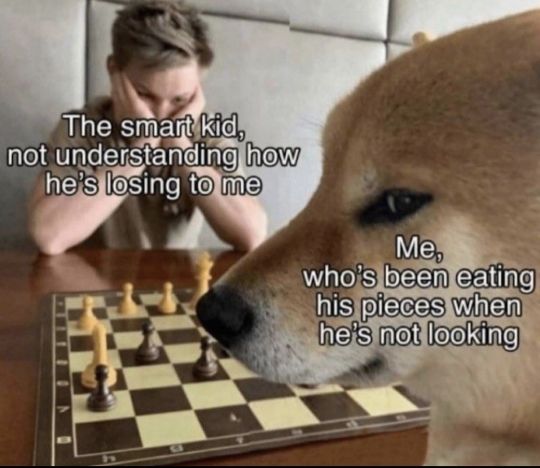
With Kabru and Laios. (To see a small collection of them, please click on the "labru chess meme" tag on this post). Would you like me to hyperanalyse this aspect of their dynamic to death and not even in a shippy manner, therefore sucking all of the fun out of the meme? Keep reading!
Spoilers for the whole manga ahead. Contains also a quantity of Winged Lion.
First of all: as noted several times, it's not that Laios is eating the pieces to win at chess, it's that he's hungry, chess pieces are available, and he thinks Kabru is a fellow chess piece eater as well. Because he offered him a chess piece. And kabru ate it. While still trying to play chess because he thinks Laios is playing chess in some novel way he wants to understand better. If you think I'm beating this metaphor to death now you haven't seen anything yet.
The thing is. Kabru's whole thing is about finding someone who can defeat the dungeon, whatever shape that takes. And Kabru knows he cannot do it. He lacks what it takes, again, whatever exactly that is. And at some point, he makes the call that Laios has that something.
What's that something? Well. He's eating the chess pieces.
In another post I have already talked about the parallels between Kabru and the Winged Lion. Without going into it again: I think that all things aside, those two have very similar types of intelligence. They're fascinated by people and finding out what motivates them. They can be manipulative and even cruel in the quest for what they believe to be the "good ending". And they both think their end can be achieved through Laios.
See, *those two* are playing chess. Have you ever played? It's a very ancient and noble game, you know, very storied.
Two opponents, Black and White, take turns moving pieces on a checkerboard according to rules that depend on the piece itself (Towers move only horizontally but of as many squares as they please, Pawns only of one square at a time and only move towards the opposite side of the board, Bishops move only diagonally, etc etc). Players can only move one piece per turn, once per turn. Two pieces cannot be in one square. When a player moves a piece in a square that is already taken by a piece of the opposing colour, the piece that was there already is "captured" and removed from the board. The rules are actually much more complicated but this is the barest bones.
I hear sometimes the win condition in chess being described as "capturing the King". That's not entirely it. The win condition in chess is putting the opposing King piece in checkmate, that is, in a position in which the King will be captured by the opposing player by the next turn no matter what moves either of them makes.
Chess matches between masters are notorious for being impossibly long. Some last YEARS. Not only that, it's possible to draw in chess - when none of the pieces on the board have legal moves left but nobody is in check. This condition is called a stalemate.
Since the pieces can move in limited ways, mathematically, it's possible to calculate a most efficient way to move them. In 1997, the AI (real AI, not the stuff that passes for AI nowadays) Deep Blue beat then chess world champion Garry Kasparov for the first time in what is considered a milestone achievement.
It's a complicated game with very set rules and almost infinite yet calculable possibilities, is what I'm getting at. It's why it's a favourite mental exercise for mathematicians and people with similar minds. It's a problem to solve in a certain number of steps according to certain rules. There's a solidity in chess reasoning - even when you're trying to guess your opponent strategy, you still know there are things they are NOT going to do. Like eating the pieces. That's why the meme is funny. I think. I've lost sight of what normal people find funny years ago.
This is the game Kabru and the Winged Lion are both in. They are both positioned to move in checkmate (conquering the dungeon/escaping the dungeon), but they have both reached a point in which they cannot move further on their own power. They're in stalemate and they know it. They both need Laios to move them out of the stalemate.
The difference is what they choose to do.
The Winged Lion treats Laios as another check piece. An important one for sure (the Queen, even. That's a chess joke AND a gay joke). But a piece he can manipulate, that moves around in predictable ways.
Kabru, however, has spent enough time chewing on chess pieces to realise thats not where Laios' potential really lies. What he does is step aside and leave the board to Laios. He says "OK, dude. Eat the damn pieces if you must. I trust you know what you're doing."
You see. There's no rule in chess about eating the pieces. I think. Maybe they added one. But still. Most people when teaching someone to play chess would not think to add "and don't eat the pieces!" There at the end because they will assume that goes without saying. It's an unspoken rule that when you are playing a game involving pieces on a board, the pieces are not for eating.
Laios, our beloved autism knight, needs his rules spoken. Otherwise he's just gonna do whatever comes to mind. And that's what he has that Kabru lacks, and what leads him to outsmarting the Winged Lion. Because he does not think in terms of rules and limits. He does not try to guess what's the catch. He does not go after the King.
When Laios figures out what the primary motivation of the Winged Lion is (wanting to eat wishes), he does not wonder about his wider plan. He stops and thinks. That makes human wishes sound so tasty, he thinks, that a creature so powerful can give up on its life of perfect bliss and immortality on another dimension to taste them. I wonder if I could eat them too. I wonder if I could eat away the Lion's desire to eat desires - I could kill two birds with one stone!
He doesn't know or care what the aim of the game is according to the rules. *His* aim now is to eat the Winged Lion's desire. Because it would solve things, because he wants to know how it tastes like, who knows, who cares. The point is: what's the fastest way to get at his aim?
Well. The Lion promises to turn him into his ideal monster... the same one he wrote about in his book. Maybe he can add a line about the monster being able to eat desires. That would work, right?
It's such a stupidly simple plan that almost has no right to work. Neither Kabru nor the WL think about it. Because of a variety of reasons, but most importantly, because *that's not in the rules*. The rules are: Laios makes a wish, the WL realises that wish, in exchange he gets Laios' body. Laios' wish: to be turned into his ultimate monster that he wrote about in his book. It goes without saying that he can't just go ahead and add whatever to the book description. Right?
Kabru would not have thought to add a line in the book in a MILLION years. The WL does not think to check if Laios added any strange condition. It's like using one wish of the genie to wish for infinite wishes - I mean yeah nobody SAID you couldnt do that but it's obvious right? It's basically cheating... Who does that? ...what's this? Laios, what are you eating? Spit the King out!
Ps: in Italian, the word for "capture" on a chessboard and the word for "eating" are one and the same.
52 notes
·
View notes
Text
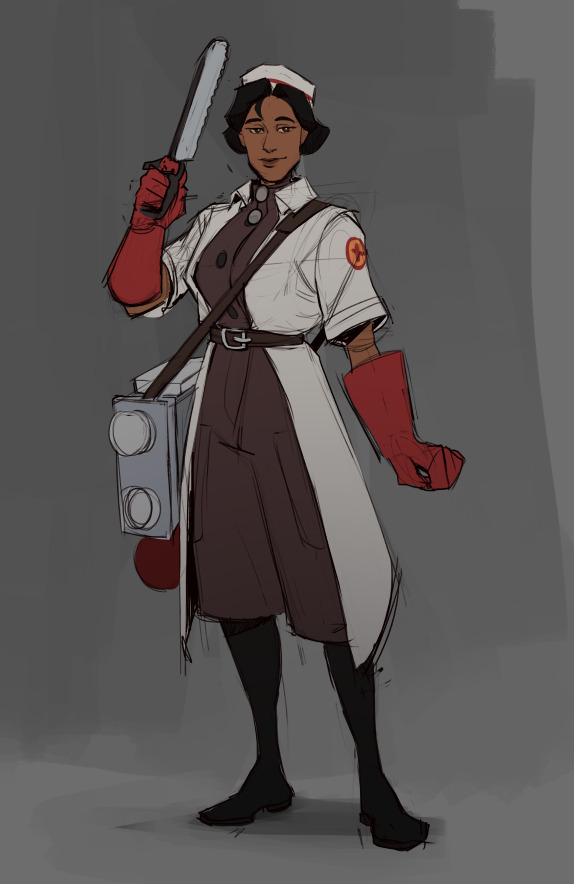
ive been looking at the female merc concepts that valve made back in the day and it really made me think about how a lot of the more popular female mercs are just genderbends of the original mercs.
nothing wrong with that, obviously, but i think it's infinitely more fascinating to treat them as their own characters since if valve had gone through with female mercs, theyd probably exist alongside the ones in the game.
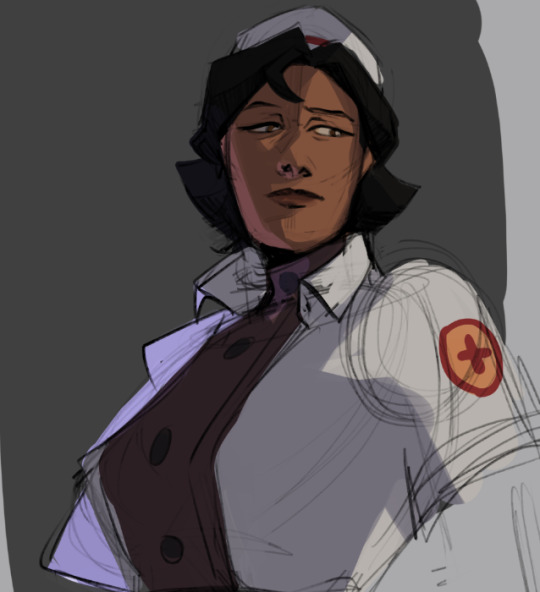
anyways, meet the medic! she's a physician from britain who practices "natural medicine". not with normal things like herbs. stuff like "you have a cold? well, they say that drinking a single drop of lava from a volcano will fix you right up! ill go ahead and write a prescription~"
she has a belief that modern medicine is wrong and wants to change it from inside of the system. not because she thinks patient care can be improved, but because crystal tonic has medicinal value guys. trust me.
in addition to that, she's got a real fascination with the spiritual and demonic. after all, who cares about how you attain immortality? you have your entire unnatural lifespan to smooth out the rough parts!
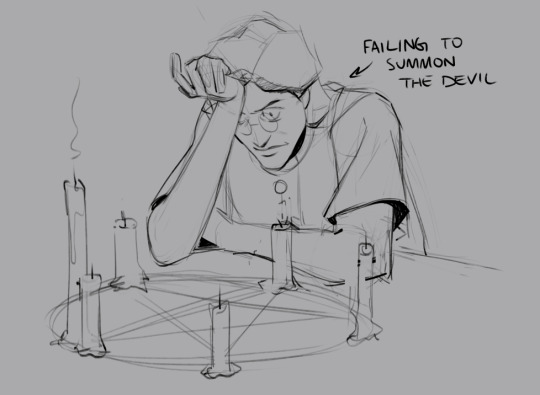
have some rough sketches for when i was searching for a design too!
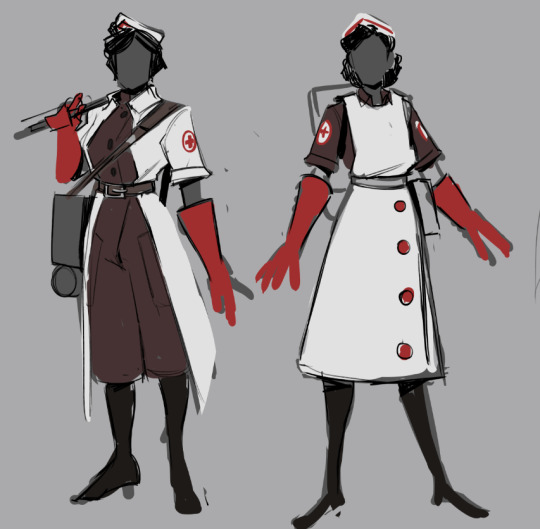
#team fortress 2#tf2 medic#tf2 femmedic#tf2#i wanted to differentiate the fields of expertise between this medic and the in game medic#while both have probably the same amount of knowledge about things like drug use and what not#tf2 medic specializes more in the surgical aspect of it#this medic specializes in topical and oral treatment#i also think its really funny if fem medic is pulling her hair out trying to figure out how to talk to the devil#and tf2 medic goes “oh yeah we talked. hes a jerk”#and then their comradery spirals from there#my art
197 notes
·
View notes
Text
jynx absolutely fascinates me as a game dev because they're like. inspiration but in the opposite way of literally everything they've ever done
jynx decided they want to make touhou-like shmups, and decided to approach this by building most patterns around extremely fast bullets relying entirely on player reaction or having already seen a pattern before, infamously the most disliked and player-antagonistic way of approaching bullet hells
jynx added a great iteration on touhou-like shmups with flash bombing, an infinitely regenerating way to clear bullets if you put yourself in active danger in contrast to the use of bombs as a safe but finite resource, and then made sure you could only use it if you aren't focusing your shots, which you spend over 90% of a touhou-like doing
jynx created "absurdly extra" stages just as a complete fuck you to the player. half of them are humanly impossible to complete
jynx's version of character development is to add more characters. jynx will drop one of the most fascinating backstories you've ever heard that has groundbreaking and sweeping impacts on len'en lore, yet somehow being entirely consistent with it, and then proceed to do literally nothing and minutes later introduce another character with one of the most fascinating backstories you've ever heard. len'en has 40+ characters and all of them have been in perpetual Big Things Are Coming hell for over half a decade
jynx has spent over an alledged 15 years working on the world and lore in mugenri and the outside world, desperately wants to share this and continually mentions the short stories and lore dumps they write, which we never see, because they have somehow convinced themself the only way to show this story is through touhou-likes, which are notable for showing "story" as an excuse for people to shoot bullets at each other
jynx treats feature creep like an arms race. there isn't a single idea they come up with that doesn't end up in a game or is planned to at a later date. len'en 4 is still technically unfinished despite it having enough paths to dwarf all the previous len'en games combined thrice over and featuring the entire cast of the series in it (i will stress again, 40+ characters), and they've promised a dlc with even more stuff to do
jynx wanted to make a mobile cafe management simulator after having made nothing but bullet hell shmups on pc, just because it sounded fun, realised their previous tools couldn't make mobile games well, realised they'd be going in entirely blind on a new tech stack, realised they'd be going in blind on a genre they have no experience with, decided to tag on a second entire game to the cafe management with a turn-based rpg, realised they also have no experience with that genre, continued anyway, learnt how to use unity from the ground up, realised the multitude of issues unity development brings, decided every single character also needed to be in this one with unique boss battles, realised the problems of having 40+ character assets and 5min+ music themes in a mobile game that very infamously is a platform you need to stick to strict asset and tech limitations, decided to stream in assets from a server, made it a live service game because it would be online and that was an obvious next step, stuck through it, totalling in five years of dev time to make a full "gacha" game that is generous beyond belief and makes them a net zero in ad revenue vs server costs
jynx iterates nothing. literally everything you see in their games is the first go and if it sucks, too bad
jynx creates all their music with default fl studio sounds and the touhou trumpet. everything's unmixed. they earnestly believe that loud = better
jynx, allegedly, "blacks out" when making music after hitting some kind of flow state, and wakes up with a complete track. like everything else, these are never iterated on
jynx wrote the entirety of len'en 4's 100,000+ word script in one week. i don't even have a funny comment for this one
jynx doesn't think len'en would fit the format of a visual novel despite the fact len'en 4 has a 100,000+ word script
jynx refuses to collab with anyone for any reason. motives unclear
jynx did three 12 hour back-to-back livestreams crunching to finish book of the cafe. literally no part of this is a good idea
jynx is like the quintessential representation of everything you shouldn't do as a game dev. they should have burnt out years ago and been remembered as nothing but a random quirky touhou ripoff that was an interesting yet janky interpretation but ultimately went nowhere and YET here we are coming in to len'ens decade anniversary
how the fuck is jynx a real person. why am i so obsessed with everything they've ever made
#txt#len'en#this started as like 2 sentences then ballooned#i have many thoughts about jynx as a dev
280 notes
·
View notes
Note
Psssst. You mentioned no one cares about Philemon, but now I'm curious if you have any thoughts about his role in the games after he disappeared. And for sillies sake, does he have anything to do with the Dance games?
I have been waiting my entire life for this. Anon do you realize how verbose I'm going to get. DO YOU REALIZE? I hope you like read mores. Let me preface this with I am aware and have seen some popular theories, so I'm going to sidestep a lot of them and present one I've built since... well, I became a Persona fan as a teenager. MAJOR PERSONA SERIES SPOILERS LIKE THE ENTIRE THING OK? OK. yes even royal.
The P2 PSP additional scenario is so incredibly important and I think everyone missed the point of it. THE PERSONA 2 PSP ADDITIONAL TATSUYA SCENARIO!!!! It's beyond important, because it reveals to us Philemon can have more than one Avatar we know about, just like Nyarly. (Casual reminder he's like half the shopkeeps in P2. Time Count, anyone? Why was the Time Count so hot. Anyway.) Disclaimer: I'm just a casual fan who has played a LOT of Persona and SMT. I haven't gotten around to all of them, but I've played/finished both paths of 1, 2, 3 (and p3p) as well as 4 and 5. Didn't manage to get my hands on Golden but I've seen enough of it. (It's funny you ask about the dance games, they're the only ones I don't have right now! But my roommate does, and will be gone for a few months soon, perhaps I will take the time to start with p4DAN. I'm atrocious at rhythm games though so more than likely I'll find a video. Anyway.) WHAT is Philemon? If we can't define that, we can't talk about The Positivity Guy Ever.
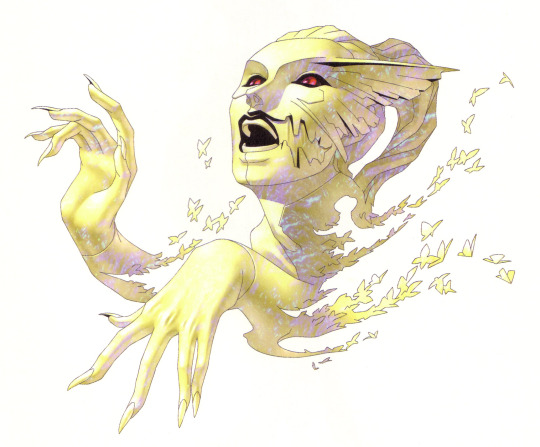
So let's talk about Phil. He's a fascinating character. His Persona is just a form of Himself, But Cooler. And he seems to HAVE no set shape, not unlike Nyarlathotep. People have various theories about Shadows and their origins etc., but Phil is more like that vote of confidence in people. I think, personally, that after the end of Innocent Sin, Phil's been pretty weak. We see in Eternal Punishment he's fading pretty roughly, and has a hard time talking to the party. Presumably ending Nyarly might to some degree fix things when Deja-vu Boy goes home, but... the problem is, we don't know how fixed they truly ended up being, or the full depth of how much he could/did expend!
In fact, the first time we even see Phil without the dumb mask is when Tatsuya decks him. Pay close attention to that fact. To the mask motifs here. I want you to really soak in Phil's everything. He's a leader. A kind soul. He's the good of people. He wants to believe the best.
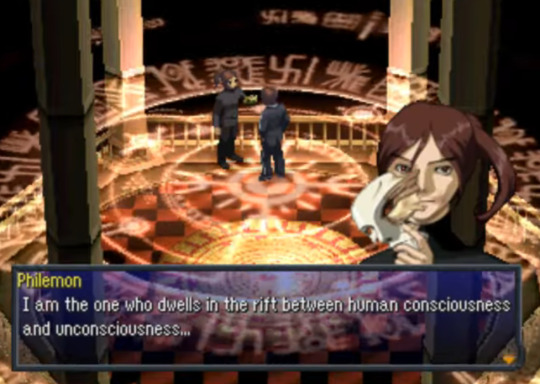
Anyway, most of these things overlook what I find really interesting as we've gotten more games worth of lore: he and Nyarly aren't the only eldritch entities walking around like that. Yes, Nyx is one too. Yes, it's probable she may even be their 'mom'. It's possible they all came from Nyx initially, but it's also possible (and should be considered) they too may have been outsiders at one point. We need to ask ourselves how far the human collective unsconsciousness can go. Is that sea infinite? Could it affect other worlds? Think about Aion in Devil Summoner Soul Hackers 2. Yes, I am asking you to think about Soul Hackers 2. Deal with it, I don't care. They're sister series. They share many things. SO! Did the shape of the human mind change a bunch of eldritch creatures and make them interact with us even more after Nyx smacked the moon a gazillion years ago? Is there multiple worlds? Weird bullshit? Just the two? Hmm. Well... I, personally, think so. I think he was touched by humanity just like Nyarlathotep, but in the other way. The reason I bring this up is two-fold. The first is Nodens. Now, we don't know much about the actual Nodens, unfortunately, just some speculation. Which is a shame. (If anyone has more info I'd love to have it, ngl. As a pagan this shit fascinates me.) But what we do get on him in Lovecraftian lore can provide us some intriguing possibilities about Phil's everything, which the games love to keep really rather vague. (And this is putting aside that his human Persona is based off the obviously bogus Jungian Spirit Guide, but we love an old guy in a mask anyway. He probably felt that was more 'friendly' for humans, hah.) I believe that Nodens, and Phil by extension, are just as responsible for nurturing and keeping the collective unconsciousness alive and positive. We see the butterfly symbol everywhere. We see it with Lavenza, too. "This is truly an unjust game." So was the bet Phil made with Nyarly, a game he rigged. Phil made the mistake of thinking the Crawling Chaos wouldn't cheat, a mistake he is never making again, I assume, if he can help it. Shit, you could view his boss fight in P2EP as him trying to train the EP crew to beat the snot out of Nyarly, even. But off topic. If Nyarly is basically the father of all Shadows, and they and Personas are the same coin, it makes me wonder a lot of things. The two have always been portrayed as simultaneously diametrically opposed, but also not? They have identical halls in P2. They have similar powers and talents... I think after Persona 3, Phil's remnants sank into the Collective Unconsciousness, to attempt to rehabilitate humanity from what it lost, from what he himself lost. I think Igor took over the room, because he took a backseat to recover. It would go a long, long way towards explaining why only SOME characters have the tier of the Wild Card, which is similar to the 'original' Persona power. (Having multiple.) He was took weak to remain in his Spirit Guide (Philemon) form, and had to abandon it to return to the depths as Nodens... So. Let me go back to Nodens and make some notes about design.
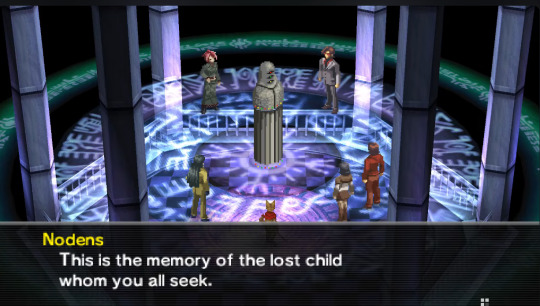
Nodens, as seen here, sort of resembles an iron maiden. It really brings to mind the idea of maybe Tatsuya or someone's humanoid form sleeping within it, doesn't it? Fitting for an aspect of Philemon! ... You probably can see where I'm going with this, but let me pull up some screens to finish the point:
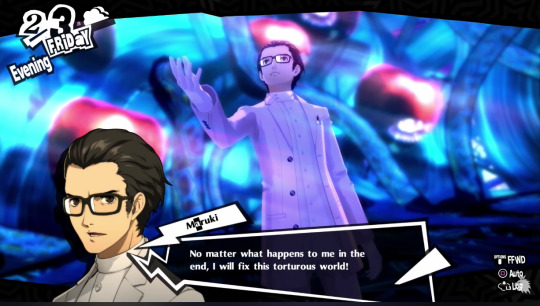
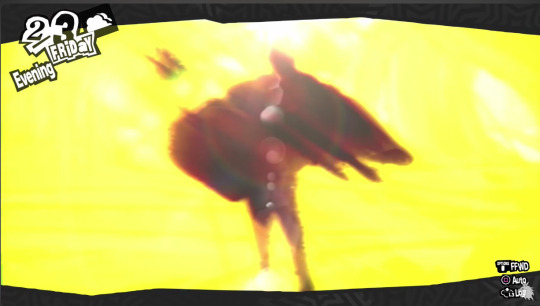
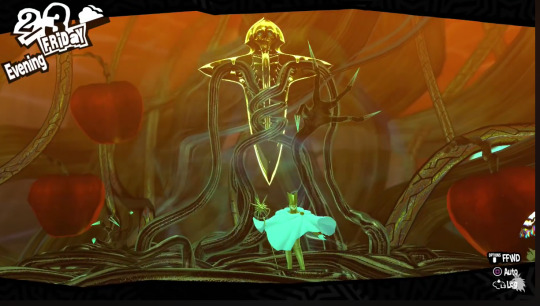
That's right! It's Azathoth, Baby! I believe that unlike mythology, he's yet another aspect of Philemon. Eldritch positivity, in too much force, could be used for accidental bad, too. (Reasons Maruki is my favorite Law Hero, haha.) Let me explain. I think Philemon always existed in... let's call it parts. Azathoth is said to be a dreaming god in whom's universe we all just happen to be alive inside, right? "Dream of butterfly" (Philemon) "Or is life a dream? Don't wanna wake up. Cuz I'm happy here." That sure is thematic to what Maki goes through in Persona 1, and what Maruki's beloved suffers, isn't it? ISN'T IT. The "true reality" he creates... would help Maruki create in the additional Semester--would be something most humans would never pass the muster to even try to control. But we have seen Phil test a few people and find them worth passing before! However, that seems like ages ago. Why has he been so quiet? I think because he was spending time conserving his energy. He believed in humanity enough to give Makoto a push when it was needed in p3 (or femc, if you play her), but otherwise trusted Igor while he restored what needed it. But in Persona 5 Royal, he hand-picked Maruki, didn't he? At first, when I played Persona 5 Royal, I really thought it was some part of Nyarly, but I no longer believe this to be the case. The coloration and symbolism in the background (the golds, the whole garden of eden themes, the way his Palace was laid out), the whole sea of soul motifs in P3Re later... mmm. I have a lot of thoughts about this, but this post is already way too long for one simple ask. So let's wrap up by going one step further and looking finally at Nodens' dialogue to the party in the Extra Scenario in Persona 2: Eternal Punishment (PSP). The following is a transcript, you can find a video here:
Nodens: This is the memory of the lost child whom you all seek. Nodens: Memory occasionally brings about much distress and suffering, but it is absolutely vital to distinguish oneself from others and manufacture one's own psyche. Nodens: Ever since it began, life's memory has accumulated unbroken, passing through individual experiences and spanning several generations. Nodens: And so it has given shape to Kadath and the Collective Unconsciousness, thereby becoming a foundation for the next generation. Nodens: Even if the roots of the world are directed by fear and anxiety, never forget that the true essence of life is brimming with joy. Nodens: You must not stop seeking the answer for why life was born in a cosmos progressing towards absurdity and chaos. Nodens: Life brims with joy, bringing about balance in a universe predestined to heat death, and that allows the world to live a long time.
So to answer your question, I think he's taken a much subtler role. I think he's influencing people by pretending to be a Persona for Maruki, because he believes it will help them grow. I don't think he was intending a forever-control vice grip, but rather to prove a point. No matter what, the primordial chaos of humanity will rise up for chaotic good, lawful good, whatever "good" is needed. Azathoth is... interesting. Adam Kadmon is also interesting. But mostly I HIGHLY suspect we may see him again in Persona 6, or at least I'm hoping so. It's my personal pet theory by then he'll be less faded and come back to us in a new form of some kind. He's never had a set one, after all. Now for funsies about the dancing game, well, he's a positive guy, he wanted to just make sure everyone had their fitness regimen checked off. Obviously. (This is a joke.) Did the devs intend this? I'm honestly not sure? Like there's a lot of nods to older Personas in 5 and now 3RE especially, but it's definitely worth chewing on. I could go on and on about things I think he's connected to, but ultimately they have the final say lol. I'm just a crackpot conspiracy theorist on tumblr who really likes Philemon. He and the Room are my favorites. :) Ask me about attendants for additional dumb, sometime, I guess lol.
#persona#persona 1#persona 2#persona 3#persona 4#persona 5#persona spoilers#p5r#philemon#persona 2 innocent sin#persona 2 eternal punishment#nodens#text#long post;#SORRY NOT SORRY THIS IS ONE OF MY ETERNAL BRAINROT QUESTIONS HERE#I live and breathe overthinking SMTPersona
71 notes
·
View notes
Text
Amanda Headcanons
Cuz everyone else is doing it, and it seems fun.
Amanda/Rebecca
Amanda has morbid interests
She loves reading and drawing
She likes tragedy stories
Would love Puella Magi Madoka Magica
Would love The Girl From the Other Side
The more the games go on the more she starts acting like the kind person Rebecca used to be.
Doesn't like pink
Is a tomboy
Likes goth stuff (based on that one outfit Rebecca has)
Probably had a lot of friends
Was the outgoing one in the friend group
Probably liked hikes and nature and stuff (I mean the show is based on her going on adventures)
Had some sort of trauma prior to meeting Sam (Sam hinted at this in one of the secret tapes)
Loves cats
Fascinated by death
We'd probably be besties, ngl, if that's not cringe to say, lol.
Afraid of the dark.
I could see her enjoying dancing in her spare time.
Doesn't know how to do her hair
Didn't know how to do chores at first and learned over time
Hates being interuppted
Has a bit of an anger issue
Struggles to trust people
Super smart - did well in school
Would remind the teacher about homework (idk why i just feel like she would).
Loves animals
I don't think she's pessimistic she just choses to be realisitc
Her pockets are infinitely deep
Has trouble sleeping due to nightmares.
She likes ALL the colors. But I can see red and black being her favs
Expresses a lot with her body
The queen of sarcasm.
Will put her own needs and feelings aside for others
Loves to cook
Always itching to try something new
Skydiving was somewhere on her bucket list
Has a bucket list of all the things she wanted to do and places she wanted to go.
Sneaks off to have alone time without Wooly or Riley
Isn't a big fan of having everything she says and does watched by thousands of people.
Reads a lot of books when we aren't watching the tapes.
Would probably scream randomly just to scare the crap out of Wooly
Teases those she cares about
Would stand up to bullies on the playground.
Probably held funerals for dead animals she found in the backyard
Would just wander off into the woods sometimes and not return until dinner.
Wooly
Will avoid thinking about sad stuff at any cost
Autistic
Sings in the shower
Stores stuff in his wool.
Insomniac
Likes pink
Is probably a follower rather than a leader
Insecure about his appearance/being a sheep
Has a lot better control over his emotions
Bottles everything up ^(the real reason lol)
Bounces a bit when excited
Tries to be the mature one (despite having moments that clearly show he isn't).
Likes having the cameras attention.
Vegetarian (it just makes sense to me)
Doesn't like loud noise
Disassociates often
Would rather watch the same show/movie over and over and over again then start something new (and it drives Amanda insane).
Didn't have many friends
Before their friendship fell apart Wooly was super clingy to Amanda like practically her shadow.
Gets embarrassed when Amanda or Riley catch him being silly/himself
Probably had anxiety and panic attacks
Doesn't like sad stories.
Would probably hide in a dark, quiet space if overstimulated.
Sleeps with a stuffed animal. For some reason tho I could also picture him having so many stuffed animals on the bed that he can barely fit on the bed and they all end up on the floor and he'd probably be the type to apologize to them if that makes any sense.
For some reason, he doesn't know how to apologize.
Would probably make friendship bracelets
Likes some traditionally "girly" activities
Forgets/loses things all the time
Wooly used to "baa" as a stim sometimes but stopped doing it after the whole farm incident out of fear it would happen again.
He stims a lot
Socially awkward
Likes some nice warm milk before bed
Has a fear of heights
Never brushes his wool
Enjoys getting it blow-dried tho.
I prolly have more I haven't thought of. Might make a part 2 or reblog with more if I feel like it.
#amanda the adventurer#amanda the adventurer 2#maddykpost#wooly the sheep#ata 2#amanda the adventurer wooly#amanda the adventurer headcanons#headcanons
22 notes
·
View notes